Friday September 30, 2011
My 2011 MLB Awards: What's So Valuable About an MVP Who Isn't Best?
It's the end of the 2011 regular season in Major League Baseball, and what an end, and before the postseason begins and we all root, root, root against the much-hated Yankees, here are my picks for the following awards. Major League Baseball won't announce its winners until November but you get mine here and now. Who loves ya, baby?
- AL MVP: More words have been written on the word “valuable” in the phrase “Most Valuable Player” than Norman Mailer wrote in his lifetime, but I toss the semantics argument to the side without even resorting to e.e. cummings. MVP is just a fancy way of saying “best” so just pick the best player in the league and move on already. For me, it's Jose Bautista. Led the league in HRs, walks, OBP, SLG, OPS. Tenth in batting. Walked more than he struck out. And while similar sluggers like Adrian Gonzalez, Miguel Cabrera and David Ortiz made extra outs by topping the league in grounding into double plays, with 28, 24 and 23 respectively, Bautista is tied for 77th in this category with a mere 8. The argument I'll listen to: Miguel Cabrera.
- NL MVP: Matt Kemp. Led the league in HRs, RBIs and runs. Second in OPS, SLG, stolen bases (yes) and hits. A homerun shy of the 40-40 club. The argument I'll listen to: Ryan Braun.
- AL Cy Young: Do we do this? Is it necessary? Does anyone not know this already? League leader in ERA, strikeouts, wins, innings pitched and WHIP is the Tigers' Justin Verlander. That's your man. I don't think there's another argument.
- NL Cy Young: An argument here is apparently more necessary. The NL pitcher who leads all the above categories except for innings pitched is Clayton Kershaw, but some (Rob Neyer) have suggested that various sabermetrics numbers favor Roy Halladay, who already has a passel of Cy Young Awards. I passel on Halladay (and Neyer). Kershaw all the way. (Question: Has any team had both MVP and Cy Young Award winner on their club and not gone to the postseason?)
- AL Rookie of the Year: An argument could be made for Eric Hosmer of KC, with his .799 OPS, or Mark Trumbo of the Angels, with his 29 homers, but both guys struck out tons against not many walks, which doesn't bode well for careers. It's really a pitchers' year in this category, and most voters will go either for Jeremy Hellickson's ERA (2.95) or Ivan Nova's wins (16-4). But, admittedly biased here, I opt for Seattle's Michael Pineda, who led the other two in strikeouts (173 vs. Hellickson's 117 and Nova's 98), K-BB ratio (more than 3:1 vs. less than 2:1 for the others), and WHIP (1.10). The big man tired as the season progressed, and he played for the Lousies so he didn't win a game after July. But he's still the man. Now straighten out yer hat, kid.
- NL Rookie of the Year: Not as versed in the NL but it seems to be a battle of the Braves, right? First baseman Freddie Freeman vs. closer Craig Kimbrel and his 46 saves, 2.00 ERA and 1.00 WHIP. He gets extra points for rounding. Kimbrel.
- AL Manager of the Year: I don't know how you pick anyone but Joe Maddon of the Rays.
- NL Manager of the Year: Kirk Gibson. In his first year, his team goes worst to first. Pump that arm, Kirk.
- 30-30-30-30 Offense of the Year: The Seattle Mariners. For the second year in a row.
Which is a good segue into the more personal awards...
- My best game: I went to about a dozen, most at Safeco Field; and while it was nice seeing Michael Pineda get his first Major League win, and it was nicer seeing the hapless M's beat the mighty Yankees on four ground-outs at the end of May, giving me a 4-0 record on the year, I mostly saw them lose in the second half of the season (I wound up 6-5), and it left a bad taste. So I'm going with the sunniest game of them all: July 4, Target Field in downtown Minneapolis, with Dad and a Hamon Killebrew Root Beer. Twins won, 7-0, over the Tampa Bay Rays, who were obviously going nowhere.
- My most historic game: Mariano Rivera's 600th save. With video to prove it.
- My worst game: Larry Bernandez Bobblehead Night at Safeco Field: Saturday, August 27. My rant here.
- My favorite player: I might be too old for this. I was happy every time Pineda pitched or Dustin Ackley stepped to the plate. M's are going young. That's the way to go. But if I have to choose I'll choose Brendan Ryan. He's a good defensive shortstop, he's a character, and he's scrappy. Plus he does things like this. Plus he makes things like this.
- Farewells: Dave Niehaus and Harmon Killebrew.
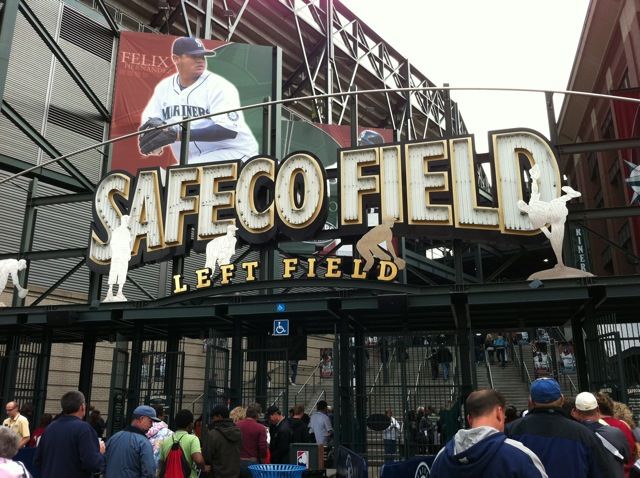
2011 Fan Appreciation Night: M's management appreciating that they still have fans.
Thursday September 29, 2011
Wow
I was out last night with friends at a bar called “Still” on Capitol Hill, where I'd periodically check my iPhone for scores. Baseball scores. It was the last game of the regular season and the fates of four teams were yet to be decided. None were my team, or teams, but I'm a fan of the game and not just my teams. This is my time of year.
At one point it all seemed over: The Tampa Bay Rays were down 7-0 to the New York Yankees in late innings and the Boston Red Sox were beating the Baltimore Orioles 3-2 in the 7th. That game was delayed. It looked like Boston's epic collapse would stop here, on the last day of the season, and Boston would squeak into the playoffs after all.
Even when I left the bar it seemed over. I was checking the scores via ESPN's website, which is notoriously unfriendly to iPhones (anyone know of a good baseball-score app?), and, though the Rays had managed to score six (six!) in the bottom of the eighth, the site had given them a “0” in the bottom of the ninth. “Game over,” I thought. “So much for that,” I thought. Some part of me, the Yankee-hating part of me, roots for the Sox, even though, financially speaking, David-and-Goliath-speaking, I should be rooting for the Rays; but I still felt a touch of sadness. The Rays were so close. Plus it would‘ve been nice if the Yankees had ended the year losing four straight.
By the time I got home and turned on the MLB network, it was all back on. ESPN was wrong with their zeroes (zeroes): The Rays had tied the game with a two-out, bottom-of-the-ninth homerun by Dan Johnson (a guy with a .389 OPS) and were battling the Yankees in extra innings. The BoSox, meanwhile, seemed to be battling themselves: they had nothing but scoring opportunities in the 8th and 9th and got bupkis. Meanwhile over in the National League, the wild card race I thought was over (because I thought the St. Louis Cardinals began the day a game up, and they’d killed the Houston Astros earlier in the day) was, in fact, still on: Cards only a half-game up on the Braves, who were battling the Phillies in the 13th.
Holy crap.
Braves went down first. No biggee. They never really had a chance. Not against the Cards but against the Phils, whom they'd have to face sooner or later in the postseason.
Over at Camden Yards, after the Sox failed to score with men on first and third and nobody out in the top of the ninth, closer Jonathan Papelbon came in to close the door. He got two outs, strikeouts, Adam Jones and Mark Reynolds. Then Chris Davis, a third baseman, a man who started the day with exactly 1,000 career at-bats and a .301 on-base percentage after four years in the bigs, and who was batting eighth in a pretty crappy Orioles line-up, stepped to the plate.
Do the butterflies of a million fans a thousand miles away affect the players? Affect the ball? Make it tail in toward the middle of the plate? Does our nervousness, our assumption of loss, make loss more likely for events we‘re merely watching?
Because Davis doubled down the right field line.
Now Papelbon faced the no. 9 hitter with the unlikely name Nolan Reimold. Another part-timer. A guy with eight doubles on the year. Two balls, two strikes. One strike away. Papelbon was doing a good job keeping the ball away, and Reimold looked like he had no shot. For a moment it seemed the Red Sox Nation, not to mention the Red Sox themselves, could heave a sigh of relief, and turn to one another and say, “Wow, I can’t believe that almost happened.” Which is when it happened. The ball drifted over the center of the plate and Reimold smashed it into the right-center gap for his ninth double of the season, his 44th RBI of the season, and a tie game.
At the exact same time, the Yankees, who had men on first and third with nobody out in the top of the 12th, began to blow it. Ground ball to third and the lead runner was caught napping by Evan Longoria. One out, men on 1st and 2nd. Chris Dickerson struck out. Two outs. Brett Gardner grounded out. End of inning.
At the exact same time—and the guys at the MLB Network were going a bit nuts here—Robert Andino, the Orioles lead-off hitter, stepped up. A former Marlin, 27 years old, with a career .302 on-base percentage. He was the guy, the other night, who hit the sixth-inning, two-out, three-run inside-the-park homer against the BoSox—the first inside-the-park homer by an Oriole at Camden Yards ever. Now here he was again. He swung and connected. Line drive to left field. Carl Crawford, the BoSox hugely disappointing $142 million off-season signing, from the Tampa Bay Rays of all teams, slid to catch it. He didn‘t. He trapped it. As if, yes, in a nightmare, he picked it up and threw it in but too late, Reimold scored, and the O’s won and the Sox lost and they could only wait to see what happened in Tampa. To see if there was anything of their season worth salvaging.
Meanwhile, in Tampa, B.J. Upton was at the plate when the scoreboard flashed the final score in Baltimore and the crowd, even in this sad-ass, no-fan town, began to cheer and whoop it up. Did it distract Upton? Maybe. He went down swinging.
Longoria wasn't distracted. I forget which pitch it was. The second? Third? No, wasn't it a 2-2 count? Either way, off the bat, I thought it was a double. He swung and the ball rocketed to left field and I assumed it was a double in the corner. Then I noticed the corner. It juts out at the Dome in Tampa. When Dan Johnson hit his homer in the bottom of the ninth, it went to right field, and squeaked over the portion of the fence that juts out in the right-field corner. If an outfielder had been standing there, it looks like he could‘ve caught it without much jumping. He could’ve caught it nonchalantly. But nobody was standing there and the ball squeaked over and tied the game, and that's what Longoria's ball did, too, in the bottom of the 12th, on the exact opposite side of the field. It squeaked over the portion of the fence that juts out in the left-field corner ... and resonated. The moment suddenly had meaning and finality. It solidified everything. It happened.
The ball squeaked over the wall in the 9th. It squeaked over in the 12th. It squirted out of Carl Crawford's glove. David Ortiz squibbed it in front of the plate.
It's a long season. 162 games. This season started horribly for Boston and well for the Orioles. It ended horribly for Boston and well for the O‘s. The Yankees stood to the side, paring their fingernails, as they seemed to in this final series, losing all three games, with scrubs, mostly. But you can’t blame the scrubs. Look at the other teams' scrubs. Look at Chris Davis and Nolan Reimold and Dan Johnson. 162 games, more than $1 billion spent on players, and the season tottered one way or the other on the journeymen. Remember Doug Strange? Remember Alex Diaz? Mariners fans do. That's part of the joy.
The real joy is this: 9 games back in September, 7 runs down in the 8th, two outs in the bottom of the ninth.
How could the postseason be more exciting than this?
Go Brewers. Go Diamondbacks. Go Tigers. Go Rays.

Dan Johnson, rounding first.
Tuesday September 27, 2011
Moneyball: Revisited
This past week, for obvious reasons, I've been reading Michael Lewis's “Moneyball: The Art of Winning an Unfair Game” for the first time since I reviewed it for The Seattle Times back in 2003.
Being a fan of Bill James, who, in the 1980s and '90s, revolutionized the way we looked at baseball statistics, I never doubted the efficacy of what Oakland A's general manager Billy Beane, the first Jamesian in a Major League Baseball front office, was doing. I.e.,:
 To compete in an unfair game, in which your opponent has three times your payroll (now: five times your payroll), you have to find what is undervalued and buy it, and what is overvalued and sell it.
To compete in an unfair game, in which your opponent has three times your payroll (now: five times your payroll), you have to find what is undervalued and buy it, and what is overvalued and sell it.- What was undervalued, in 2002, was on-base percentage, which is a more reliable measure of a hitter's potential to score runs, and thus help win games, than batting average, the measure of hitting prowess for most of baseball history.
- The plate discipline necessary to create a high on-base percentage was a less teachable trait than people believed. At the same time, it was translatable from the college to the professional level: a guy with a high OBP in college would tend to have a high OBP in the Majors. Thus college-level players with high OBPs were players worth drafting.
Since 2003, whenever anyone's disparaged “Moneyball” and Beane, and it's happened a lot (here, for example), I've defended. If the Oakland A's were having a hard time of it recently, I argued, it's not because the concepts of “Moneyball” failed; it's because they succeeded all too well and were adopted by other, richer GMs, such as Brian Cashman of the much-hated New York Yankees, who made OBP his touchstone, too. That particular market inefficiency, which Beane had exploited for years, had corrected itself. Thanks in large part to Michael Lewis's book.
* * *
But the Jamesian stuff is only one aspect of the philosophy conflated into the term “Moneyball.” Beane also attempted to upend long-standing baseball traditions because of his own sad experience with the national pastime.
In 1980, he had been a prized, five-tool, high school player, a first-round draft pick with a “good baseball body” who never quite panned out, even as less-talented but gung-ho teammates such as Lenny Dykstra became stars. From this, Beane, the GM, concluded the following:
- Scouts are overvalued.
- Body type doesn't matter. (“We're not selling jeans.”)
- High school players, particularly pitchers, aren't worth a first-round draft pick.
Basically he never wanted to draft himself.
Reading in 2003, a part of my brain went, “Wait. Ken Griffey, Jr. and Alex Rodriguez were drafted out of high school.” But such thoughts were pushed aside as Michael Lewis's narrative propeled me along.
Re-reading in 2011, these thoughts weren't pushed aside.
There's a big set piece in the book, the June 2002 draft, and reading it in 2003 one accepted Lewis's interpretations of Beane's assumptions because the drafted names were just that: names. They meant nothing. Now they do ... or don't. Now they're superstars ... or not.
This, for example, was Billy Beane's wish-list for the 2002 draft:
| PITCHERS | POSITION PLAYERS |
|
|
Just names back then. Now they have numbers, too.
Nick Swisher was Beane's baby, and he took him with the 16th overall pick, and Swisher has panned out more or less: first for the Oakland A's, then for the Chicago White Sox, and now, most famously (and ironically), with the New York Yankees. His career batting average, on-base percentage and slugging percentage are: .254/.360/.467. Not stellar but pretty good.
Meanwhile, Prince Fielder, who was disparaged in the book as “too fat even for the Oakland A's,” and was picked 7th overall by the Milwaukee Brewers (saps!), is having a better career: .281/.388/.537. He's a star. Swisher's a character but he's not a star.
Obviously the A's, with their 16th pick, couldn't have chosen Fielder; but here's the thing: they wouldn't have chosen him anyway. He was a high school player. And that was too close to Beane's own experience.
How about the player who went after Swisher? The 17th overall pick belonged to the Philadelphia Phillies who chose, yep, a high school pitcher (saps!), named Cole Hamels, who, after making the bigs in 2006, has gone 74-54, with a 3.54 ERA and a 3.75 K/BB ratio.
I don't doubt the efficacy of the basic Bill James lessons from “Moneyball.” But, re-reading, I'm beginning to doubt the efficacy of the lessons Billy Beane culled from his own sad experience with the national pastime. Maybe scouts are more necessary than he thinks. Maybe high school players should be considered in the first round.
* * *
Let's check.
In the five years after the “Moneyball” amateur draft, from 2003 to 2007, 189 players were chosen in the first round of the draft. Of those 189, 85 were high school players. Of those 85, eight have become Major League All-Stars, including current NL MVP candidate Justin Upton, current NL Cy Young candidate Clayton Kershaw, and Pittsburgh Pirates center fielder Andrew McCutchen.
Of the remaining 104 first-round draft picks, all out of college, 17 have become All-Stars, including current AL Cy Young candidate Justin Verlander, current NL MVP candidate Ryan Braun, and former Cy Young award winner Tim Lincecum.
The odds of drafting a future All-Star are greater with college players, at least in this small sample size, 16 percent to nine percent; but given the chance on a Justin Upton or Clayton Kershaw, not to mention a Ken Griffey, Jr. or Alex Rodriguez, why not take it? Why ask to see the B.A.?
The A's were one of only two teams—the White Sox were the other—who didn't draft a high school player in the first round during these five years. Here's who Beane chose instead:
- Brad Sullivan, Brian Snyder and Lauren Geminder in 2003
- Landon Powell and Richie Robnett in 2004
- Cliff Pennington and Travis Buck in 2005
- No one in 2006
- James Simmons in 2007
Only the three hyperlinked names made it to the bigs. Of those three, none has a career OBP above .325.
* * *
So is Billy Beane misreading the lessons of his own life? If so, he wouldn't be the first.
What was the problem with Beane as a young player? Was it his body type? His five-tool talent? The fact that he was merely a high school player? Not really. The real problem, delineated by Lewis but subsequently ignored by Lewis for the larger narrative, was his personality, which didn't handle failure well. He obsessed over it. He began assuming he wouldn't succeed and wound up not succeeding. Guys like Lenny Dykstra? They never doubted. (Which ultimately, after baseball, brought Dykstra down, too.)
And for those with doubt? There are coaches like Ron Washington, “Wash” to his friends, who, during the 2002 season, took a former catcher, Scott Hatteburg, necessary because he came cheap and had a talent for getting on base, and turned him into a “pickin' machine” at first base. Wash is now manager of the Texas Rangers, who won the American League penannt last year, something Beane's A's (and my sad, sad Seattle Mariners, for that matter) have yet to do.
The scouts in the book come off as daft oldsters who pay attention to the inconsequential (“a good baseball face”) and miss the bigger picture (the Jamesian stats). But maybe sabermetricians like Beane and his assistant, Paul DePodestra, are missing the bigger picture, too. Maybe the point isn't upending conventional wisdom so much as balancing it with their own unconventional wisdom. Maybe the point, as in so many areas of baseball, is simply balance.

* * *
There are a lot of ifs associated with “Moneyball.” If only Tim Hudson had pitched up to his usual standards in the 2002 ALDS and the A's had gotten past the Minnesota Twins and eventually to the World Series. If only Jeremy Brown, the fat Alabama catcher with the gaudy OBP drafted in the first round by Beane, had panned out. (Jerry Crasnick suggests the attention from “Moneyball” did him no favors, but, to his credit, he did retire with a .864 OPS.) If only Brian Cashman was like most Yankees fans and didn't read.
The book feels poignant now. It's full of regrets.
Does Michael Lewis have any? Billy Beane helped change the game but so did Lewis. His best-seller stabilized the market inefficiencies Beane had been exploiting. It was as if Lewis had shown David's playbook to Goliath. When the two returned to the field, Goliath had a slingshot of his own.
More, does Lewis regret the following analogy? It is, without a doubt, the most shocking thing about reading “Moneyball” in 2011 rather than 2003.
First, a little backstory. Baseball is often about luck. A pitcher may make a good pitch, a batter may mistakenly swing at that pitcher's good pitch, but it still might result in a bloop single to left. Old baseball hands say such luck evens out over a season, and a career, and maybe it does, but the stats people would still like to remove it from the equation. They would like to get a truer picture of past performance and thus a better indicator of future performance. They would like to minimize risk.
In Chapter Six of “Moneyball,” Lewis writes about a company that is doing just that: AVM Systems, run by two former Chicago stockbrokers, Ken Mauriello and Jack Ambruster. These guys take a baseball field, divide it up into thousands of mini-grids, then track every baseball hit during a game by velocity and trajectory and landing point (point #643, for example), and place value judgements on every action. Was the hit a true hit? Was the right fielder properly positioned? Would an average right fielder have caught the ball? Etc.
These guys are part of Moneyball strategy, too, and Lewis writes about them in glowing terms. He even compares what they do—the cutting up a baseball field into thousands of meaningless fragements—to what was then a very successful, very lucrative, and virtually riskless area of Wall Street: derivatives. The cutting up of stocks and mortgages into meaningless fragments, and bundled together to minimize risk.
The kinds of people who were transforming baseball for the better, in other words, were thus just like the kinds of people who had transformed Wall Street for the better. Both were minimizing, or, in Lewis's words, “more accurately” pricing, risk. He writes:
The chief economic consequence of the creation of derivative securities was to price risk more accurately, and distribute it more efficiently, than ever before in the long, risk-obsessed history of financial man.
If only that had been the chief economic consequence of the creation of derivative securities.
Monday September 26, 2011
Movie Review: Drive (2011)
WARNING: YOU GIVE ME A TIME AND A PLACE, I’LL GIVE YOU SPOILERS
“Drive” is the best Michael Mann movie I’ve seen in years.
Of course it’s directed by Nicolas Winding Refn, an up-and-comer who directed “Bronson” a few years back, from a screenplay by Hossein Amini, who adapted James Sallis’ novel, but Mann’s influence is all over this thing. It’s a bit of the story of “Thief” mixed with the mood of “Collateral.” This is not an insult, by the way. It’s one of the higher compliments I can give.
 The movie is a mood alterer. It’s L.A. as dreamworld. The feel you get is of a long drive, where your thoughts just drift away to the hum of the tires on the road. It’s a near silent film with an unexpected soundtrack, an unsettling score, and moments of pure romance and purer violence. Sometimes these moments are right next to each other. The best kiss I’ve seen in the movies in years (in years, ladies) is immediately followed by the hero, the unnamed Driver (Ryan Gosling), stomping on a guy’s head until the guy doesn’t have a head. Literally.
The movie is a mood alterer. It’s L.A. as dreamworld. The feel you get is of a long drive, where your thoughts just drift away to the hum of the tires on the road. It’s a near silent film with an unexpected soundtrack, an unsettling score, and moments of pure romance and purer violence. Sometimes these moments are right next to each other. The best kiss I’ve seen in the movies in years (in years, ladies) is immediately followed by the hero, the unnamed Driver (Ryan Gosling), stomping on a guy’s head until the guy doesn’t have a head. Literally.
Driver is a man with three car-related jobs: he works in the garage of Shannon (Bryan Cranston), a man past his prime still looking for his big score; he’s a stunt driver in the movies, a gig Shannon set up for him; and he’s a getaway driver for hire, a pure professional with no attachments to his clients. A la Mann.
The first words we hear in the film are his, and they’re both proposal and philosophy:
“You give me a time and a place, I give you a five-minute window. Anything happens in that five minutes, I’m yours, no matter what. I don’t sit in while you’re running it down and I don’t carry a gun. I drive. You understand?”
After those five minutes, he’s gone. You’re on your own.
Do you like those words? Savor them. Because you won’t hear Driver say anything else for another 10-15 minutes of screentime. Driver is so laconic he makes Clint Eastwood’s characters seem like Joe Pesci’s characters.
Initially this annoyed me. Initially I felt there was too much atmosphere and not enough substance. I’m not a fan of cool, or profess to be such, since cool is silent and distant, and the most interesting people I’ve encountered in life are the ones who are most engaged. Who talk. I’m a word man. Driver is not. He’s most definitely cool, with his toothpick in his mouth or tucked behind his ear, and so silent, a man of so few words, that I began to wonder, a half-hour in, if there wasn’t something wrong with him mentally. Was he autistic? And yet, despite all this, by the end of the movie I had absorbed him, or he me. I could feel it as I put on my yellow biking jacket, so similar to his silver racing jacket, and my biking gloves, so similar to his driving gloves, and walked out of the theater immersed in the dreamlike silence of the movie. I imagined I was tough and cool and hard-to-read instead of what I am: a tired 48-year-old in need of a shave and a beer. Holden was right. The goddamn movies.
Basketball is the key to the opening scene. Driver makes the above deal with the Lakers game on television, then waits in his car, big wristwatch on the steering wheel, while his clients rob a building and he impassively listens to both b-ball game and police band radio. Time ticks down. One guy emerges. The car is nondescript, a late-model Impala, but with a race-car engine. Smart, but we figure, despite the subterfuge, despite the attempt to fit in, there’s no point in the race-car engine unless it’s going to be used, right? Sure enough, when the other guy emerges, the alarm goes off, and off they go. The police are tracking them now. Driver tries to blend in with his late-model Impala but they’re after him, on him, more efficient than any police force in the real world. Except instead of the freewheeling ride through the city we expect, with its hairpin turns and squealing tires and car crashes, we remain inside the car for most of the chase while Driver uses his knowledge of the streets of LA to duck under canopies and hide in shadows. The basketball game is still on—Driver must be a huge fan, we think—and at a stoplight, with a cop car directly opposite him, he actually turns up the volume. Because he knows the chase is over and he can relax now? No, because the Lakers game is ending and the Staples Center is nearby, and Driver drives into its garage, parks, puts on a Lakers cap, and walks out, past the cops, with the rest of the crowd. Clean.
So that’s our guy. He’s a great getaway driver, he’s a great stunt driver—we see him do a rollover, wearing some kind of creepy, protective latex mask that makes him look like the Toxic Avenger—and he’s the best mechanic Shannon has ever seen. But he’s not a story. Not yet.
Two things happen to make him a story. Shannon convinces a local mobster, Bernie Rose (Albert Brooks), to bankroll a racecar with Driver as his driver; and Driver develops a relationship with his neighbor Irene (Carey Mulligan).
Neither thing actually comes to fruition—Driver never drives for Bernie and he and Irene never truly hook up—but both things still intersect in a way to create the story.
The movie keeps going in unexpected directions. Driver and Irene slowly and silently build their relationship, and, while romantic, it’s platonic. Is he going to kiss her here? No. Is he going to say something there? No. He shifts his toothpick from behind his ear back to his mouth and leaves. But he’s got a nice relationship developing with her son, Benicio (Kaden Leos), and behind the quiet between Driver and Irene one can feel the pressure—romantic, sexual—building. It’s in their looks and the music and the mood. Except it turns out she’s married. Her husband, Standard (Oscar Isaac), is in jail. Then he’s out. There’s a welcome-home party and a confrontation with Driver in the hallway. Standard senses all that pressure within Irene, and he senses his son’s affection for Driver, and he doesn’t like either; but Driver, in his impassive, nearly autistic way, defuses the tension. Of course we know the tension will only mount again, right? Because Standard is the unwanted guy now—certainly by us, and probably by Irene and Benicio—and he won’t take it lying down.
The next time Driver sees him he’s lying down, in their underground parking garage, his face bloodied and bruised. Benicio is cowering near the elevator, an unused bullet in his hand. Placed there as a warning by the guys who bloodied Standard.
We get the story. In prison Standard had to pay protection money and now they want more. Two thousand? Twenty? Does it matter? What they really want is for him to rob a pawn shop in broad daylight. Irene remains innocent of it all—she thinks drunk kids beat up Standard—and the bad guys are closing in, so Driver does the decent thing: He decides to help out his rival to protect Irene and Benicio. He agrees to drive for him.
The job goes awry, of course, Standard is killed, and Driver and the bagman, Blanche (Christina Hendricks, surely no man), hole up in a dive motel. They were supposed to get away with 40K, they wound up with $1 million, but the TV news reports no money was stolen. Driver knows something’s up, he knows Blanche knows, and he forces her to give up information and take him to the people responsible. But too late. The gangsters are already outside the motel.
It’s an interesting moment. Driver is out of his element—he’s not in a car—and, as per his philosophy, he doesn’t carry a gun. He’s trapped. He’s like us.
But he’s not. Instead he turns out to be methodically, impassively brutal, and he’s the only one who leaves the motel room alive. His blood-splattered face here reminds me of Martin Sheen in “Apocalypse Now.” His racing jacket, which will get progressively stained, reminds me of Bruce Willis’ T-shirt in the original “Die Hard.”
The heist was planned, it turns out, by Nino (Ron Perlman), a gangster compatriot of Bernie, and the man who crippled Shannon years back, in order to rip off east coast mobsters who were stashing money at the pawn shop. But now it’s all turned bad. Driver wants to give the money back but Nino is too stupid to accept it:
Nino: What do you get out of it?
Driver: Just that. Out of it.
Except there is no out of it. We’re in “Godfather III” territory now. Driver keeps going up the chain of command to extract himself; but the higher up he goes, the worse it gets.
Did anyone else think Gosling sounded like a young Mickey Rourke? That kind of low-level cool but without the rakish charm? His Driver is sad-eyed and mechanic. When he finally kills Nino in the nighttime California surf, he’s almost like an automaton. He’s like Death, approaching slowly and steadily and inevitably. Say it: He’s the Terminator, and the movie is another action-hero/revenge flick but filmed for the art-house crowd. It’s designed to disturb as well as give pleasure. It creates doubt about our wish-fulfillment fantasies rather than certainty. Enough doubt? Feel free to discuss below.
To the kiss—the best kiss I’ve seen in years, ladies. I almost don’t want to talk about it because its power lies, in part, on its unexpectedness. But it’s too good not to talk about.
In their apartment building, Driver, Irene, and a third man ride the elevator to the parking garage. The third man is a hit man for the mob, which we know, and which Driver suspects, and of which Irene is, of course, innocent. Refn allows the music and tension to build. Then, in slow mo, Driver sweeps Irene to the side. In anticipation of launching an attack? No. To kiss her for the first time. Earlier in the movie, Refn built up the anticipation of romance only to forgo it. Here, he builds up the anticipation of violence only to relieve the previous romantic tension. For a second anyway. Driver, for all his near autism, turns out to be a far-seeing man. He knows the appearance of the mob at his place means his name is known, and greater involvement with Irene will only threaten her, so his kiss is both a kiss hello and a kiss goodbye. It’s the kiss that’s supposed to sustain him through everything he has to do to keep her safe. To sustain him through the rest of his life. But we’re romantics in the audience. We hope the kiss means something else. We want it to go on. And just when think it might go on is when Driver turns and relieves the tension over the impending violence.
Sunday September 25, 2011
Mariano Rivera, Career Saves, and another YANKEES SUCK article from The New York Times
Now that Mariano Rivera has become the career saves leader, surpassing Trevor Hoffman's 601 last week, The New York Times' Dave Anderson, in a special YANKEES SUCK article entitled “Mr. Young, Mr. Ryan, Mr. Rivera Will Be Joining You,” sees something historic in the stat. He writes:
His record 603 regular-season saves deserve a monument alongside those honoring Cy Young’s 511 victories and Nolan Ryan’s 5,714 strikeouts and 7 no-hitters.
Why does Anderson feel this way? You have to dig to find it. Cy Young's victory total is far ahead of the no. 2 man, Walter Johnson, who won 417, while Nolan Ryan's strikeout total is far ahead of the no. 2 man, Randy Johnson, by 839 Ks. Each dominated his stat. They had no rival. Just like Rivera.
But wait. Isn't Mo only 2 saves ahead of Trevor Hoffman? That's hardly “far ahead.” Both relievers, to be sure, are far ahead of the no. 3 man, the former saves leader Lee Smith, who retired with 478. But Rivera isn't out there by himself. Hoffman is with him.
Anderson solves this with a bit of subterfuge:
... even if the 41-year-old Rivera were to retire soon, his postseason numbers would separate him from any and all bullpen challengers.
It's a stupid article. The objective greatness of Mariano Rivera isn't in the career saves stat; it's in his career ERA, for which his only rivals are dead-ball pitchers from 100 years ago, and in his post-season record, which is unprecedented.
Anderson actually downgrades the man he's trying to elevate. Rivera isn't honored because he has the career saves record. The career saves record is honored because it now belongs to Mariano Rivera.
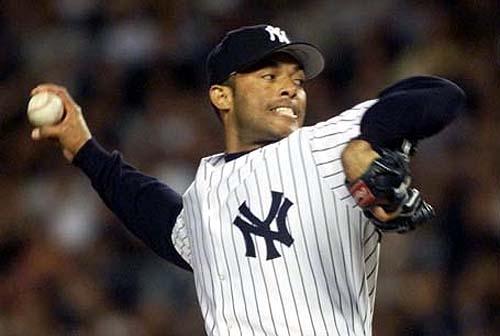
Saturday September 24, 2011
A History of Baseball Movies: From hitting a homerun for Timmy to hitting a homerun with Susan Sarandon
It's tough for me to be around the Internet this weekend because I get distracted by these kinds of things. “Moneyball” gets released and so every site has its baseball movies article. In the above link, Salon goes to the experts—Nicholas Dawidoff, Roger Kahn, Joe Posnanski, et al.—and asks two questions: 1) What's your favorite baseball movie?; and 2) Why aren't there better baseball movies?
I answered both questions in 2007 for MSNBC.com without being asked. Here's my lede. No, screw it. Here's the whole freakin' piece.
Two years ago, people were scratching their heads over the idea of “Moneyball” as a movie. Stats? Sabermetrics? What the? But I knew. It's not only a classic Hollywood story—underdogs triumph—it's the classic baseball narrative of the last 30 years. Misfits band together, and, through knowledge, teamwork and that one guy, and against all odds, begin to win.
But I'll still take sex with Susan Sarandon.
Play Ball!
Baseball Movies From “Pride of the Yankees” to “Fever Pitch”
When Bobby Thomson hit a three-run homer in the bottom of the ninth inning to lift the New York Giants over the Brooklyn Dodgers and into the 1951 World Series, sportswriter Shirley Povich wrote the following: “The art of fiction is dead. Reality has strangled invention. Only the utterly impossible, the inexpressibly fantastic, can ever be plausible again.”
When Kirk Gibson hobbled to the plate and hit a two-run homer in the bottom of the ninth inning to lift the Los Angeles Dodgers over the Oakland A’s in the 1988 World Series, broadcaster Jack Buck shouted the following: “I don’t believe what I just saw!”
And that’s the problem with baseball movies. The unbelievable in a game makes you stand up and cheer. The unbelievable in a movie makes you stand up and walk out.
Storytelling is about making life more dramatic; yet if the best of baseball is already too dramatic to be believed, where does that leave storytelling? How does Hollywood dramatize it?
Here’s what they’ve tried.
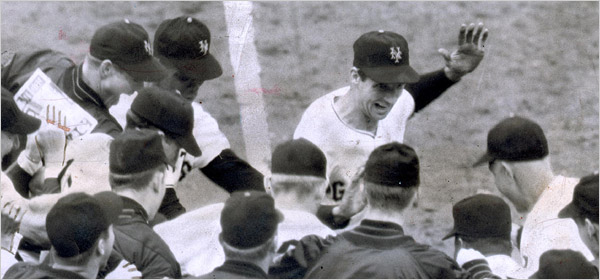
“The Giants win the pennant! The Giants win the pennant! And they're going crazy! They're going crazy!”: Try to do that in a movie.
Hitting a home run for little Timmy in the hospital
Initially they produced biopics where the point wasn’t the baseball so much as the lack of baseball. Something always had to get in the way of playing.
Consider “The Pride of the Yankees” a template. Sure, Lou Gehrig was a great player — 2,130 consecutive games, third-highest slugging percentage of all-time — but Hollywood could care less from slugging percentage. They made his life into a movie because he died of the disease that now bears his name: amyotrophic lateral sclerosis, or ALS. His life, and the subsequent movie starring Gary Cooper, had a classic dramatic arc: rise (Yankee stardom), fall (ALS) and resurrection (“I consider myself the luckiest man on the face of the earth”).
Most baseball biopics in the 1940s and ’50s followed suit. In “The Stratton Story,” Monty Stratton, played by Jimmy Stewart, is a solid pitcher for the Chicago White Sox (rise); then his leg is amputated after a hunting accident (fall); but with a wooden leg, he makes a comeback, and pitches well enough to make the minor leagues (resurrection). Same arc for Dizzy Dean in “The Pride of St. Louis” (pitching star/arm injury/radio broadcaster) and Jimmy Piersall in “Fear Strikes Out” (taciturn outfielder/nervous breakdown/recovery).
Then feature-film baseball biopics disappeared for decades. They returned in the early 1990s with a couple of mediocre attempts: “The Babe” with John Goodman, and “Cobb” with TommyLeeJones. More recently, there was “The Rookie,” a good, quiet film starring Dennis Quaid as Jimmy Morris, a high school science teacher who makes the Tampa Bay Devil Rays squad at the age of 35. But “The Rookie” is in a different category: Less the fall of a titan to mortal status than the rise of a mortal to titan status. It almost belongs with the recent glut of films about fans: “Everyone’s Hero,” “Game 6” and (someone please get Jimmy Fallon and Drew Barrymore off the field already) “Fever Pitch.”

An autographed ball isn't enough. A home run isn't enough. No, little Timmy's one greedy bastard.
Hitting a home run for the broad in the second row
Why did Hollywood abandon the biopic? Jim Bouton is partly to blame (or thank). In 1970, he published his memoir of the 1969 season, “Ball Four,” and it blew the lid off the game, revealing, amid the day-to-day commentary of a guy just trying to fit in, the smallness of management and the stupidity of players. These guys weren’t hitting home runs for little Timmy in the hospital; they were popping “greenies” and trying to look up women’s skirts. Hard to fashion a feel-good biopic around that.
Yet Billy Crystal’s “61*” did just that. The HBO film — not quite a biopic — gives us a warts-and-all account of the 1961 Yankees, and the friendship between Mickey Mantle (Thomas Jane) and Roger Maris (Barry Pepper) as they battle for the single-season home run record. What makes the movie powerful — besides the fact that Crystal, a lifelong Yankee fan, gets every freakin’ detail right — is that Maris’ rise and fall occur simultaneously. The more home runs he piles up (the rise), the more the press and public turn against him (the fall), because he’s not “the right Yankee” to break the mark. Extraordinary pressure is thus created, and that pressure is felt in Pepper’s performance, and in the release we feel when No. 61 flies out and the sparse hometown crowd finally, finally gives the man the standing ovation he deserves.
This shouldn’t need saying but fallibilities make characters more interesting, not less, and great baseball biopics are waiting to be made if studio execs only get off the schneid. You’re telling me you can’t make an interesting movie out of the life of Satchel Paige or Hank Greenberg or Roberto Clemente? Why not ignore the career for the season? Give us Jackie Robinson from the time he signed with the Brooklyn Dodgers in the fall of 1945, through the ’46 season with the Montreal Royals, and end the film on April 15, 1947, the day he broke the color barrier. Talk about extraordinary pressure! There wouldn’t be a dry eye in the house.

Barry Pepper as Roger Maris in Billy Crystal's “61*.” More complicated heroes of the modern era.
Misfits win! Misfits win!
So what’s replaced baseball biopics? This formula, mostly: A team of misfits keeps losing; then they find a way to win; then they play for the championship at the end of the season.
This describes everything from “The Bad News Bears” to “Major League” to “Angels in the Outfield,” with films differentiated by: a) how teams start winning, and b) that final game.
How do they start winning? For some, it’s the myth of the one guy. Team sucks, this one guy wanders in the locker room, everything changes. Often he’s associated with magic. Roy Hobbs (Robert Redford) has a kind of mystical lightning about him in “The Natural,” while Joe Hardy (Tab Hunter) is the work of the devil in “Damn Yankees!” An annoying little kid with a 100-mph fastball (Thomas Ian Nicholas) turns the hapless Cubs into winners in “Rookie of the Year.” You could even say the turnaround for the Angels in “Angels in the Outfield” is the work of one guy. The big guy. Which seems to me a violation of the 25-man rule.
Other teams begin to win through the myth of teamwork. This rationale is big in movies where the lead character is a selfish S.O.B.: Jack Elliot (Tom Selleck) in “Mr. Baseball” and Stan Ross (Bernie Mac) in “Mr. 3000.” Once the S.O.B. subsumes his gargantuan ego to the group, they start winning. Hollywood, with its above-the-line talent, relates.
Finally there’s the myth of knowledge. The players don’t know what they’re doing wrong, so it’s up to someone, generally an outsider, generally a kid, to set them straight. In 1953’s “The Kid from Left Field,” it’s the batboy, Christie (Billy Chapin), who’s getting tips from his ex-big league dad. By 1994 and “Little Big League,” the studios knew how to pander to kids. Thus Billy Heywood (Luke Edwards), who inherits the Minnesota Twins from his grandfather, is fatherless and turns the Twins around on his own. Daddies? We don’t need no stinkin’ daddies.
The best baseball films tend to combine rationales. The Bears in “The Bad News Bears” need Coach Buttermaker to care enough to impart his knowledge, they need to work together, and they need that one guy, Kelly Leak, to get them over the hump. They get it all. The beauty is it’s still not enough. That’s why the film resonates after 30 years. Read your Roger Kahn: “You may glory in a team triumphant, but you fall in love with a team in defeat.”
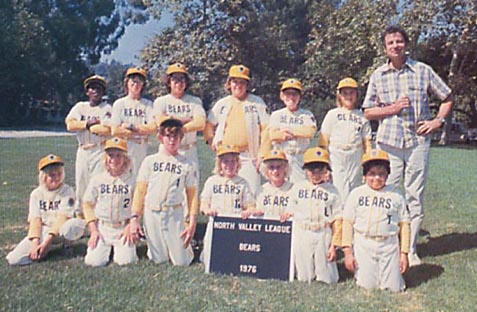
The best of the misfits. “Hey Yankees! You can take your apology, and your trophy, and shove it straight up your ass!”
Hitting a home run with Susan Sarandon
Which brings us to the final game of the season. How do you end it with a bang as big as Bobby Thomson’s and still be believable? “The Natural” got away with it by making their home run bigger than any home run could ever be. They made it mythic.
Other films play smallball. Jake Taylor (Tom Berenger) wins the big game in “Major League” by majestically calling his shot, a la Babe Ruth, and then bunting in the winning run. Jack Elliot wins the big game in “Mr. Baseball” by selflessly giving up the chance to set a Japanese home run record ... and bunting in the winning run. In “Mr. 3000,” Stan Ross selflessly gives up his chance for his 3,000th hit by — you guessed it — bunting in the winning run. You could call it a theme.
I’ll still go with how my favorite baseball movie, “Bull Durham,” handles the big game. The Durham Bulls start out, typically, as misfit losers, but thanks to the wisdom of Crash Davis (Kevin Costner), the arm of Nuke LaLoosh (Tim Robbins), and that magical quality where everyone suddenly starts playing well together, they begin to win. And they seem headed for the big game ... when Nuke is called up and Crash is cut loose and he and Annie (Susan Sarandon) spend a glorious sex-filled weekend together before he heads out to find another team where he can quietly set the record for minor league home runs. Afterwards he and Annie talk about their future and, amid quotes from Walt Whitman and Casey Stengel, the summer, the season and the movie ends.
The big game? There is no big game. And for most teams ending their season this week, not to mention most of us, that’s the most believable ending of all.
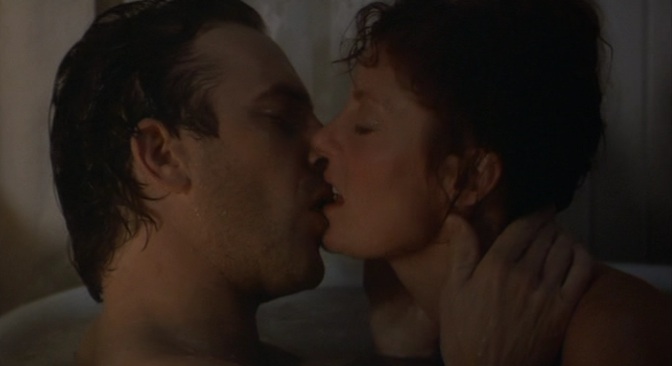
It ain't the big game, but it'll do.
--Erik Lundegaard sees great things in baseball. It’s our game, the American game. It will repair our losses and be a blessing to us. You can look him up at http://www.eriklundegaard.com/index.php
Friday September 23, 2011
Never Compromise: Hollywood and the Right-Wing
Jeff Wells talks up the latest poster for “The Iron Lady,” Meryl Streep's biopic of Margaret Thatcher, and its tagline, “Never compromise,” and riffs on all the anti-Obamaites in Congress who would agree with that slogan, who would rather “pull down the temple than be responsible legislators,” and concludes, even as he admits he's going to like the hell out of Streep, “no heart-swelling emotional currents for Meryl's Maggie Thatcher...not from this corner, at least.”

What all of that reminds me of, again—again, again, again—is how the right-wing in this country borrows the tropes of Hollywood heroes (“never compromise”) even as it disparages Hollywood.
Sure, this time it's slightly different, since the uncompromising hero, or heroine, is in fact a politician, and a right-wing politician, rather than John Wayne, or Bruce Willis, or Arnold. But she's still being viewed through that Hollywood and PR prism. And it raises the question:
Why does the tagline, “Never compromise,” appeal to us?
Immediate answer: Because most of us, poor wretches in the audience or in the voting booth, compromise all the time. We spend our lives compromising: with parents, with partners, with bosses; with expectations, with kids, with corporations; with life. Life for us is one compromise after another. Only life doesn't compromise back. (And Death is even worse.) We feel like we're the saps in all this.
That's why we go to the movies in the first place: to see that uncompromising hero or heroine. It's a wish-fulfillment fantasy, as surely as watching a man fly is a wish-fulfillment fantasy, and that's fine as long as we don't take the fantasy with us as we leave the theater.
But more and more of us are doing just that. We're taking that fantasy, now generated by the GOP—the less entertaining, right-wing version of Hollywood—into the voting booth and voting for the man who claims he never compromises. Which is as silly as going into the voting booth and voting for the candidate who claims he can fly.
Friday September 23, 2011
Why is The Seattle Times Linking to Exxon PR Blogs?
Doing some research on The Seattle Times website the other day I came across the following link (right-hand column, third down):

I noticed the headline certainly. The NY Times reporting poorly. Didn't have their facts. According to who? Exxon Mobile Perspectives? You're effin' kidding me. Why is this even on a legitimate news website? Or is The Seattle Times no longer a legitimate news website? Or have we created a culture where legitimate news organizations are so desperate for money they'll do what they need to do to survive. Like linking to Exxon Mobile Perspectives.
I clicked through but didn't even bother to read the article by Ken Cohen, vice president of public and government affairs for Exxon Mobil Corporation. But I did see his latest post: HIGHER TAXES ON OIL COMPANIES WON'T CREATE JOBS. Really? Hard hitting.
How does that guy sleep? How do I?
Thursday September 22, 2011
Quote of the Day
“[Bill] James's first proper essay was the preview to an astonishing literary career. There was but one question he left unasked, and it vibrated between his lines: if gross miscalculations of a person's value could occur on a baseball field, before a live audience of thirty  thousand, and a television audience of millions more, what did that say about the measurements of performance in other lines of work? If professional baseball players could be over- and under-valued, who couldn't? Bad as they may have been, the statistics used to evaluate baseball players were probably far more accurate than anything used to measure the value of people who didn't play baseball for a living.”
thousand, and a television audience of millions more, what did that say about the measurements of performance in other lines of work? If professional baseball players could be over- and under-valued, who couldn't? Bad as they may have been, the statistics used to evaluate baseball players were probably far more accurate than anything used to measure the value of people who didn't play baseball for a living.”
--Michael Lewis, Moneyball: The Art of Winning an Unfair Game, pg. 72. The movie, starring Brad Pitt, and which has been getting astonishingly good reviews (“Has to be described as an example of what Hollywood does best” - Andrew O'Hehir; “...in its own quiet, unspectacular way, this movie courses with life” - Dana Stevens), opens tomorrow.
Thursday September 22, 2011
Tinker Tailor Soldier Whole Lot of Motherf**king Good Actors
I saw the trailer for “Tinker Tailor Soldier Spy” the other night before seeing Ryan Gosling in “Drive” (more later). Now I knew “TTSS” had been getting good notices—strong best picture candidate, etc.—and I knew it had some heavy hitters in it, Gary Oldman and Colin Firth and the like; but I was shocked, shocked, pleasantly shocked by just how much talent is in this thing. One good actor after another showed up in the trailer. “Hey, John Hurt ... Wow, that looks like Tom Hardy. Really? And Ciarian Hinds is in this, too?” Add Toby Jones and Mark Strong. Plus directed by Tomas Alfredson, who directed “Let the Right One In.”
Jeff Wells over at Hollywood Elsewhere is particularly impressed with Oldman:
I don't want to get into this too deeply because the film doesn't open for another nine or ten weeks but I can at least say that Gary Oldman's performance as George Smiley has to be considered...no, trumpeted as Best Actor-worthy. I've read a couple of reviews that claim he's not aping Alec Guinness's performance as Smiley in the 1979 British miniseries version. Well, he does seem to be doing that. To me, at least. Oldman barely moves in this thing, but oh, how he delivers! The man is an absolute pleasure just to watch...to simply regard. The stillness of him is sublime.
Opens December 9 in the U.S.
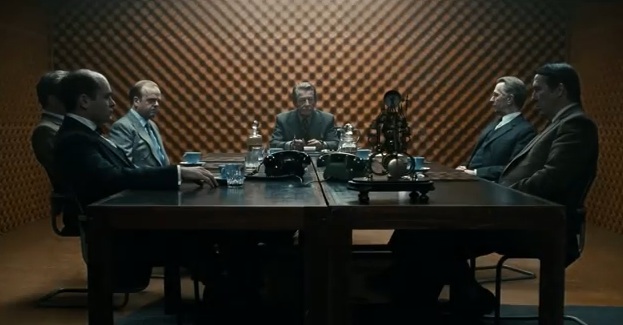
Let the master acting class begin.
Wednesday September 21, 2011
The Saddest Dusk I've Ever Seen: R.I.P. R.E.M.
This morning on Facebook I added my two cents to a thread started by Candice Michelle Dyer of Georgia. She asked: “What do you think is the saddest song in the world?” and offered “He Stopped Loving Her Today” by George Jones and “Waiting Up with Johnny” by Cabbagetown's Joyce Brookshire before letting us all loose. The thread currently has 103 responses, including Irma Thomas' “It's Raining,” Billie Holiday's “Strange Fruit,” Bob Dylan's “I Threw It All Away,” and “Hallelujah” by Leonard Cohen.
Somewhere in there is my answer: “Half a World Away” by R.E.M.
It was from their “Out of Time” album, which was released in 1991, just as the relationship that defined my twenties was ending and I was hurting. I was hurting so much I didn't want to be in the same hemisphere with her, so I returned to Taipei, Taiwan, where I'd lived in 1987-88, and taught, wrote, and swallowed more pollution. And listened to that R.E.M. album. Half a world away.
“Half a World Away” is kind of a cheat, isn't it, for saddest song, since it begins by talking about the saddest dusk:
This could be the saddest dusk
I've ever seen
Turn to the miracle of life
My mind is racing
As it always will
My hand is tired, my heart aches
Half a world away
At the same time what makes it truly sad is Michael Stipe's voice. Something about it, in my younger, more sensitive days, would make tears well up in my eyes.
Tears aren't welling up in my eyes this afternoon but I am sad for the news, heard a few hours after posting my answer to Candice's FB page, that R.E.M. is calling it quits after more than 30 years.
Here's the statement Michael Stipe posted to the band's website:
“A wise man once said, ‘The skill in attending a party is knowing when it’s time to leave.’ We built something extraordinary together. We did this thing. And now we’re going to walk away from it. I hope our fans realize it wasn’t an easy decision, but all things must end.”
But I'm not sad for them—they had a great run, and made great music—nor for me, since I still have what they made and I assume each member will continue to make music in whatever form he desires. I'm just sad that it's been more than 30 years, and that that time is gone, and this is where we are now. That that could end. Something so central. So. central.
R.E.M. helped me get through the period when the other central thing ended, so I could be here, feeling only slightly sad, as the news hit. My mind is racing.
Wednesday September 21, 2011
Movie Review: Barney's Version (2011)
SPOILERS, BOYCHIK
We first see the film’s protagonist, Barney Panofsky (Paul Giamatti), 65, waking beside empty whiskey bottles and spent cigars, and groaning. He phones a man named Blair (Bruce Greenwood), asks to speak to “my wife,” then promises nude photos of said wife so Blair “can see what Miriam looked like in her prime.” Later that day, when his grown daughter informs him that Blair had a heart attack that morning, Barney is unsympathetic. “Putz,” he says. That evening he goes to a bar to drink and watch the hockey game. But at the bar sits an old enemy, a retired Irish cop, O’Hearne (Mark Addy), who has written a book accusing Barney of a long-ago murder. “Now the whole world is going to know what a cocksucking murderer you are,” O’Hearne says two inches from Barney’s face. “You could use a mint,” Barney replies with surgical precision.
Fun! We seem to be promised the story of a tough, foulmouthed Jew.
Unfortunately, we don’t see that guy much. For most of the movie, which includes long flashbacks of a ramshackle life, Barney is a bit of a putz himself.
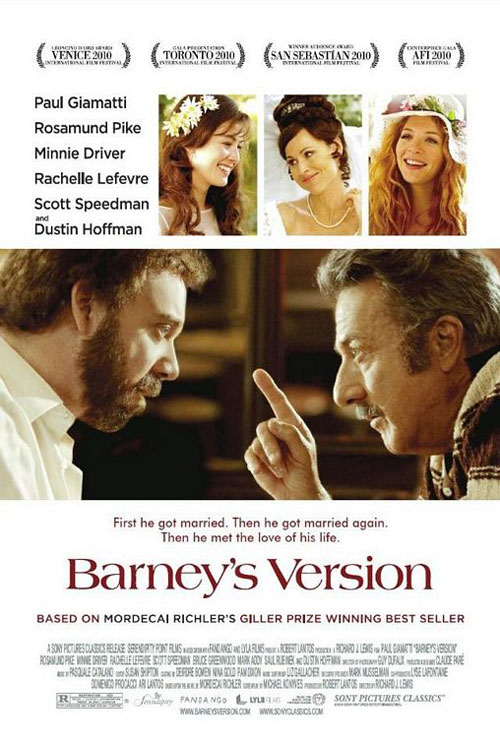 In the late ’60s and early ‘70s, Barney hangs in Italy with friends, including Boogie (Scott Speedman), a handsome, talented, would-be novelist. There’s wine and beautiful Italian women (for Boogie anyway), but Barney, against Boogie’s advice, gets married to Clara (Rachelle Lefevre), a brassy, insulting woman who is pregnant with his child. He does the right thing even though she makes jokes about his three-inch penis. When she gives birth, and the baby is black, she tells him, from her hospital bed, “Oh Barney, you really do wear your heart on your sleeve. Now put it away—it looks disgusting.” When he leaves her for good, she kills herself. Guilt laps up on him.
In the late ’60s and early ‘70s, Barney hangs in Italy with friends, including Boogie (Scott Speedman), a handsome, talented, would-be novelist. There’s wine and beautiful Italian women (for Boogie anyway), but Barney, against Boogie’s advice, gets married to Clara (Rachelle Lefevre), a brassy, insulting woman who is pregnant with his child. He does the right thing even though she makes jokes about his three-inch penis. When she gives birth, and the baby is black, she tells him, from her hospital bed, “Oh Barney, you really do wear your heart on your sleeve. Now put it away—it looks disgusting.” When he leaves her for good, she kills herself. Guilt laps up on him.
Cut to: Montreal,1975, where Barney is running Totally Unnecessary Productions, which produces a long-running Canadian soap opera. He’s also about to get married again to a Jewish hottie (Minnie Driver) whose her father doesn’t approve of him, and approves even less of Barney’s father, Izzy (Dustin Hoffman), a former beat cop.
Can I pause for a moment to say how much I love Dustin Hoffman? I don’t know if he lights up the screen but he lights up me. He shows up and I beam.
He seems to be playing more overtly Jewish these days. Here, at a dinner gathering with the rich family of Barney’s fiancée, he’s all smiles and good will and blunt charm. He says to Barney’s fiancée, “You are one sweet casserole,” and encourages them to “get to schtupping.” The father of the bride doesn’t think much of this working class man, and says something vaguely and unnecessarily insulting, which he doesn’t think Izzy will understand. But Izzy gives him a look. It’s a look I’ve seen Dustin give in other movies. It’s as if both injury and civility are competing for control of his face. It’s a look that says: “I am smart enough to recognize your insult, I am sensitive enough to be injured by your insult, but I am strong enough to look you in the face and civil enough to keep smiling.” It’s the most human of faces. It’s why Dusty is my guy. Long may he act.
At Barney’s wedding, between attempts to get sloshed and watch the Stanley Cup finals (Montreal vs. Boston), Barney sees a woman named Miriam (Rosamund Pike of “An Education”), a friend of a friend, and immediately falls in love. Yes, at his own wedding. He’s not abashed about it, either. He sits across from her, and while she tries to dampen his joy, he smiles a beatific smile. “It really happens,” he says, shaking his head. “Just like that. It’s amazing.”
He follows her onto her train bound for New York, but he’s walletless and ticketless, and married, as she reminds him, so off he goes on his honeymoon to the wrong woman, a woman who, in marriage, between shopping sprees, complains about his friends and cigars and drinking.
The movie handles all this well, by the way. It doesn’t quite stack the deck against her. She’s a pain but sympathetic. He’s charming but an asshole.
Meanwhile, his old friend Boogie, who has written exactly nothing, has become a drug addict, and Barney takes him to his cabin for a weekend of drying out. Instead, Boogie fucks his wife. When Barney finds the two of them together he is 1) shocked, and 2) overwhelmed with joy. He knows it’s his way out.
She blames her infidelity on Barney, of course, while Boogie uses an old line of Barney’s from Italy to justify the peccadillo: “It was the only thing that’d shut her up.” The two old friends then drink, Izzy’s gun is found, and out on the dock, with wildfires in the distance, the gun goes off. When Barney wakes, Boogie isn’t there. The murder he’s accused of committing in the first act goes off in the second.
But the disappearance of Boogie is soon forgotten in lieu of wooing Miriam. They have a disastrous first date in New York—he drinks too much, throws up, passes out—but she’s charmed anyway. They date, get married, have kids, have a life. His father dies, he becomes jealous of a neighbor, Blair, a vegan who’s good with boats and helps Miriam with her radio career, something Barney doesn’t do, and Miriam soon wearies of this, and of Barney’s hockey games and drinking. She leaves him for a week to visit their college-age son in New York and to give themselves some breathing space. Of course, despondent, he sleeps with another woman. Of course she finds out.
“We have life, we have a life,” he pleads.
“We had a life,” she responds.
Brutal.
I never cared for her, to be honest. All Barney’s wives were demanding but she was demanding and removed, not a combination that works for me. He sees something in her, which is why he pursues her, but what does she see in him? A reflection of her ideal self? A woman so dazzling she is pursued by the groom at another woman’s wedding? She acts like she has all the answers, but all her answers are stored inside an icebox that is rarely opened.
“Barney’s Version” is based upon the novel by Mordecai Richler, who also wrote the novel that became “The Apprenticeship of Duddy Kravitz,” and I imagine it sprawling like John Irving’s “The World According to Garp,” which made a great novel but a so-so movie. Same here. The ramshackle life doesn’t quite cohere. The resolution to the Boogie disappearance doesn’t quite resonate, either. We find out, go “Ah,” but that’s about it. The movie does make me want to read Richler, though. A good writer can whip up resonance with words. Filmmakers, poor bastards, are left with just the world.
Tuesday September 20, 2011
Quote of the Day
“When the axe came into the woods, the trees whispered, 'The handle is one of us.'”
--a Turkish proverb quoted in Arlene Kim's book of poetry, “What Have You Done to Our Ears to Make Us Hear Echoes?”

Arlene Kim reading from her book of poetry, “What Have You Done to Our Ears to Make Us Hear Echoes?” at Elliott Bay Books in Seattle; September 2011
Monday September 19, 2011
Quote of the Day
“Though I have some respect for 'The Virtue of Selfishness,' her collection of essays ... I don't think there's a need to have essays advocating selfishness among human beings. I don't know what your impression has been, but some things require no further reinforcement.”
--Christopher Hitchens on Ayn Rand, from the Q&A portion of his lecture, “The Moral Necessity of Atheism,” given on February 23, 2004 at Sewanee University
Monday September 19, 2011
The Lonely Road to Safeco Field
My friend Tim invited me to the Mariners game Saturday at 4:00, Fan Appreciation Night, or Day, or Fan Appreciation Overcast Late Afternoon, and I went more for Tim than the M's. I'm higher on the team than I've been in years, since they're doing what I urged them to do in 2004--get young--but it's a long season, and manager Eric Wedge is still trotting out the likes of Adam Kennedy (.234/.276/.354), who is 35 and has no upside, rather than some September call-up who does. But it's still fun to sit at the park, see the action, talk baseball.
I was hoping for sun but that was the previous weekend. The walk down provided its own form of gloom, too. Elliott Bay Books relocated more than a year ago, closer to where I live, but its former locatioin is still unoccupied:

The former Elliott Bay Books: a half-hour before gametime.
I found Occidental Avenue, the road to Safeco, also surprisingly unoccupied, even though it was 25 minutes before gametime.
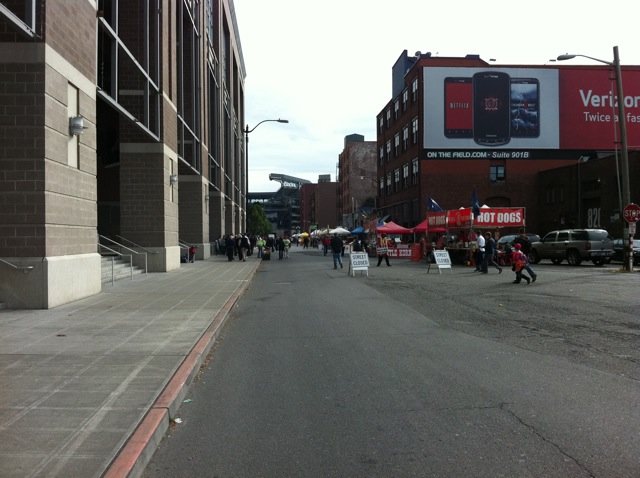
Occidental Avenue: Many of the few fans there were Sounders fans, too, whose game started two hours after the M's game.
Even the left field gate on Royal Brougham, usually bustling, is far from it 15 minutes before gametime.
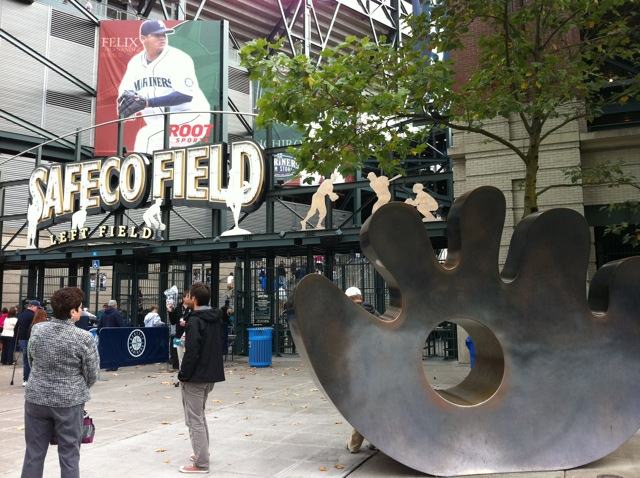
Russ Davis glove on the right; the faithful few on the left.
The game was an oddity: high-scoring, lots of pitching changes, yet surprisingly fast. Clutch hitting put the M's up 4-1 in the 2nd, but in the top of the 3rd M's starter Anthony Vasquez gave up three homers on four pitches, all blistered, and punctuated by former Mariner Adrian Beltre who practically dented the upper-deck facade in left field with his blast. The ball was just rocketing off Rangers' bats and squibbling off ours, which may explain why, down just one run in the 5th, 7-6, the game felt lost. Which it ultimately was.
Tim and I didn't win, either. Fan Appreciation Night is also giveaway night—autographed jerseys and balls, suites and seats, flat-screen TVs and planetrips, and “much much more” as they say—and Tim and I got bupkis, as per normal. The year before, sitting in the seat I now occupied, Tim's friend Bill won a suite for a game, which we all attended last April, so Tim figured our seats were shot for another few years, if in fact the giveaway is that logical. But a woman three rows in front of us won a luxury cruise for two, which was pretty cool, and Tim and I had fun riffing on some of the giveaways. Working with the Mariners groundscrew? Sounds more like unpaid labor. What next? “A chance to scrub Mariner urinals!” We imagined the winner of that imaginary giveaway being approached by the winner of a real giveaway, an autographed Chone Figgins baseball: “Wanna trade?”
7-6 was the final, putting me at 6-5 on the year. Hoping for better next year. Until then, God bless, Mr. B, wherever you are.
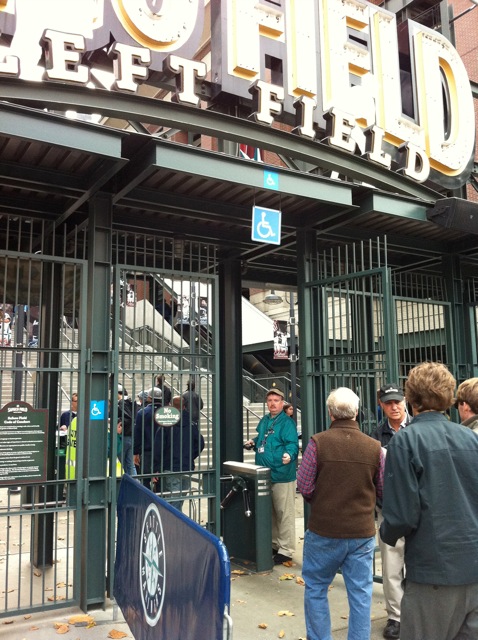
Long-suffering Mariners fan, Mr. B, center, takes tickets at the left field gate.
Sunday September 18, 2011
How great is it to be as stupid as Maureen Dowd?
In her latest column, “Eggheads and Blockheads,” Maureen Dowd chastises the Republican party as the “How great is it to be stupid?” party, which it is, by comparing its current front-runner for president, Rick Perry, to ... wait for it ... John Wayne.
So she attempts to trash a man by comparing him to one of the most iconic heroes of American cinema? How great is it to be as stupid as Maureen Dowd?
 Dowd uses John Ford's “The Man Who Shot Liberty Valance” as her prism for the upcoming presidential race. She casts Barack Obama as Ransom Stoddard (Jimmy Stewart), the thin lawyer from the east who is often bullied by the likes of Liberty Valance (Lee Marvin), whom, in a final showdown, he shoots and kills. From this he gains acclaim, becoming an ambassador to England and U.S. Senator. But it's all a lie. Tom Doniphon (John Wayne), from behind a corner store, was the real man who shot Liberty Valance. Stoddard's shot missed high and wide.
Dowd uses John Ford's “The Man Who Shot Liberty Valance” as her prism for the upcoming presidential race. She casts Barack Obama as Ransom Stoddard (Jimmy Stewart), the thin lawyer from the east who is often bullied by the likes of Liberty Valance (Lee Marvin), whom, in a final showdown, he shoots and kills. From this he gains acclaim, becoming an ambassador to England and U.S. Senator. But it's all a lie. Tom Doniphon (John Wayne), from behind a corner store, was the real man who shot Liberty Valance. Stoddard's shot missed high and wide.
What's the connection between Ford's film and our current reality? None. The comparison is facile. The connective tissue is barely there. She merely sees Obama as an egghead (forgetting Stoddard's rage), Perry as a blockhead (forgetting Doniphan's heroism), and the rest of us as the townsfolk caught in the middle (forgetting that most were stereotypical Scandinavians, a favorite Ford trope.)
As she puts it:
So we’re choosing between the overintellectualized professor and blockheads boasting about their vacuity?
What's awful about Dowd is not just her myopic dichotomies, not just her clumsy Hollywood analogies, but the fact that she misses the bigger picture. Because what's fascinating about modern Republicans, who continually trash Hollywood, is how their candidates fit so easily into Hollywood western and action-adventure archetypes. This is intentional. The party that trashes Hollywood is the party that apes Hollywood. Both the GOP and Hollywood create wish-fulfillment fantasies in good vs. evil battles because that's what we, the public, wish to see. Until reality intrudes. Which makes us wish to see it even more.
It's not an insult, in other words, to compare Rick Perry to John Wayne. It is, in fact, the whole point to his awful, awful career.
Sunday September 18, 2011
Mt. Rainier from Bandera Mountain
Saturday September 17, 2011
Movie Review: The Adjustment Bureau (2011)
WARNING: CAN THERE BE SPOILERS WHEN EVERYTHING IS PLANNED?
I can’t get past the timeline.
In “The Adjustment Bureau,” David Norris (Matt Damon), a rising political star, learns there is a team of men—and it is just men—wearing suits and fedoras a la “Mad Men,” and led by a dude named Richardson (John Slattery from, of course, “Mad Men”), who control everything. Or almost everything. They spill coffee, sprain ankles, make sure this person misses that bus and lives; make sure that person crosses this street and dies. The infuriating randomness of life? It’s not random. There’s a plan. For everything and everyone. Feel like you’re stuck in a dead-end job with a dead-end wife? Sorry, that’s the plan. Are you rich and powerful and influential? Do you feel like you’re touched somehow? You are! Greater powers than us are determining your fate! And by greater powers I’m talking ... you know. Upstairs.
 “Are you an angel?” David asks Harry Mitchell (Anthony Mackie), who is more or less David’s case officer.
“Are you an angel?” David asks Harry Mitchell (Anthony Mackie), who is more or less David’s case officer.
“We go by many names,” Harry answers.
So if angels are mostly clean-cut, trim men in business suits and hats, and God is called “The Chairman,” what’s the afterlife like? A business meeting? Or is that purgatory?
“The Adjustment Bureau” doesn’t touch on such mundane topics as death, though. It’s more interested in matters of love and free will.
“Whatever happened to free will?” David asks Thompson (Terrence Stamp), the fierce angel/case worker who is brought in on the Norris matter after Richardson and Mitchell fail. David, you see, is supposed to become President of the United States one day, but he keeps deviating from the plan to fall in love with a dancer/choreographer/free spirit named Elise (Emily Blunt).
“We actually tried free will before,” Thompson replies. Then he gives us the following timeline:
“After taking you from hunting and gathering to the height of the Roman Empire we stepped back to see how you'd do on your own. You gave us the Dark Ages for five centuries... until finally we decided we should come back in. The Chairman thought maybe we just needed to do a better job of teaching you how to ride a bike before taking the training wheels off again. So we gave you the Renaissance, the Enlightenment, the Scientific Revolution. For six hundred years we taught you to control your impulses with reason, then in 1910 we stepped back. Within fifty years, you'd brought us World War I, the Depression, Fascism, the Holocaust and capped it off by bringing the entire planet to the brink of destruction in the Cuban Missile Crisis. At that point a decision was taken to step back in again before you did something that even we couldn't fix.”
Height of the Roman Empire. Julius Caesar? Augustus? Were Caligula and Nero part of the plan? Was Jesus? Hey, good news, Christians! Whichever way it turns out with the son of God, Mohammed (570-632) most certainly wasn’t, since he didn’t come around until the decline of the Roman Empire. Take that, Islam!
Plus: For 600 years they taught us to control our impulses? 1310-1910? Right, I forgot. The Great Epoch of Tepidity, marked by continual wars in Europe, the devastation of the native populations in the Americas, and the Marquis de Sade.
But it’s the recent timeline that bugs me. The angels left us alone from 1910 to 1962. So, on our own, we did WWI and WWII and the Stock Market Crash of 1929 from all that greed, which led to the Great Depression. But didn’t we also do, on our own, Gandhi, FDR, the New Deal, the defeat of the Third Reich and fascism, the creation of the U.N., and Martin Luther King and the beginning of the civil rights movement? Not to mention “A Portrait of the Artist as a Young Man,” “Seven Samurai” and rock ‘n’ roll. Not bad for being abandoned by the angels.
I get ’62, too. Cuban Missile Crisis. World on the brink. But that means the following were all part of the plan: the assassinations of JFK, MLK and RFK; the Vietnam War and Nixon and Watergate; the disappearance of the American middle class. W. and 9/11. Afghanistan and Iraq. The global financial meltdown from all that greed, which led to the Great Recession. Plus take your pick of war, famine, genocide, and Republican president.
Who the fuck is writing this thing anyway?
It gets worse. Since ’62, the movement within the U.S., the most powerful country on earth, has been away from greater social control and toward market forces and anti-regulation and each to his own and que sera sera. And what’s causing all this? The Plan: a form of social control that would make Josef Stalin weep from envy.
Nice message, Hollywood.
Of course that’s not Hollywood’s message. The movie may be about The Plan and our lack of free will, but its ultimate message is the same as it ever was. We do have free will, we can alter the plan, and maybe someday, if we learn to control ourselves, we’ll be writing The Plan ourselves. Rah.
There are bright spots. I liked Norris’ scuffed-shoe speech. I thought Emily Blunt was flirty and fizzy and original, my immediate choice for any future, smart romantic comedy. I wondered if Matt Damon had the flu during filming—he looked a little pig-eyed at times.
The movie is based upon yet another short story by Philip K. Dick, who wrote the stories that became “Blade Runner,” “Total Recall” and “Minority Report,” but whose stories feel vastly overrated to me. They seem silly. Maybe because they remind me of the kind of thing I used to write in my twenties and thirties.
I once wrote a short story called “In God’s Waiting Room," where getting into heaven was like a job interview, which I, or my main character, Ellery Pimentel, kept failing. “The Adjustment Bureau” doesn’t feel much different from that. Here, God is the unseen CEO of a corporation in which we are all lowly members; but if you try hard enough, if you keep persisting, if you kiss the girl at the right moment in the right way, well, you still won’t be able to see Him. But He might, like any good CEO, steal your ideas.
Friday September 16, 2011
The Magnificence of the Ambersons Was Conspicuous to All ... Except that Audience Survey Group in Pomona
“We do not need trouble pictures, especially now. ... Make pictures to make us forget, not remember.”
“People like to laff, not be bored to death.”
“The picture was a masterpiece with perfect photography, setting and acting. It seemed too deep for the average stupid person. I was disgusted with the way some people received this picture.”
These comments, taken from David Thomson's book, “Rosebud: The Story of Orson Welles,” pg. 215, are among the response cards (53 favorable, 72 unfavorable) for the March 17, 1942 screening of Orson Welles' original version of “The Magnificient Ambersons,” at the Fox Theater in Pomona, Calif. It was this audience survey, this market research, that led to some of the most infamous cuts and perhaps the most horribly re-shot and re-edited ending in movie history. Add it to the list.
Way to go, average stupid person.
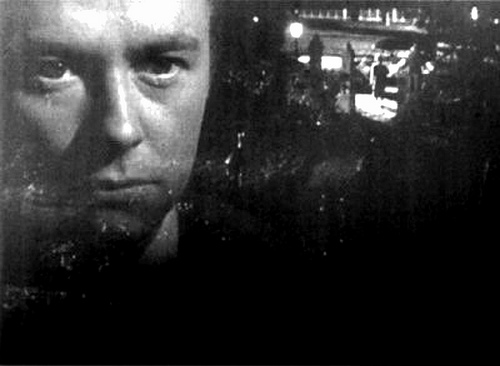
“The magnificence of the Ambersons was as conspicuous as a brass band at a funeral.” Unless, of course, you lived in Pomona.
Thursday September 15, 2011
Movie Review: Beginners (2011)
WARNING: IT’S 2011. THIS IS WHAT THE SUN LOOKS LIKE. AND THE STARS. THIS IS THE PRESIDENT. AND THIS IS A WARNING ABOUT SPOILERS.
“Beginners” is a smart, sad, ultimately affirmative film about a depressed, 38-year-old illustrator named Oliver (Ewan McGregor) struggling in a relationship with an actress, Anna (Mélanie Laurent), just a few months after the death of his father, Hal (Christopher Plummer), who, at 75, had revealed to Oliver (and to the world) that he was gay.
It’s also a film that revealed my intolerances. Watching this gay father interact with his depressed son, I realized I have a problem with the depressed.
 I have a particular problem with the indie-movie depressed. You look like Ewan McGregor, you have the talent that Oliver has—enough, apparently, to make a living—and you wind up in a relationship with someone who looks like Mélanie Laurent? Give us a smile already. Be like your father: be gay.
I have a particular problem with the indie-movie depressed. You look like Ewan McGregor, you have the talent that Oliver has—enough, apparently, to make a living—and you wind up in a relationship with someone who looks like Mélanie Laurent? Give us a smile already. Be like your father: be gay.
Hal came out a few months after the death of the mother, Georgia (Mary Page Keller), a woman he’d been married to 44 years, and who, during her battle with cancer, ate nothing but French toast, watched Teletubbies, and “skipped back and forth in time,” according to Oliver in an early voiceover.
The film does this, too. We keep skipping between Oliver’s last years with his father and his first months with Anna. The former works beautifully. The latter? Eh.
How sad is that? You put two good-looking people together, you make them artistic, actress and illustrator, and the result is stifling. Here they are at her place. Here they are at his place. Here they are at in the stacks of an old bookstore. Can someone open a window already?
They begin well. After the death of his father, which plunges him into a depression he was always skirting the edges of, his friends drag him to a costume party, and he goes as Sigmund Freud. Good joke. There, he drinks and mock-analyzes another partygoer on the couch. Then Anna takes this partygoer’s place, dressed as I’m-not-quite-sure, and writing notes rather than talking. Apparently she has laryngitis. As her character or as herself? She kinda flirts with him and he kinda flirts back. We never know what initially attracts her—he’s a fairly quiet guy in heavy beard and gray hair, after all—but later in the evening he removes the beard and looks like Ewan McGregor. So: Jackpot.
What do they do together as a couple? I hardly remember. After the party, in his car, he says he’ll go where she points, and they wind up driving on a sidewalk and laughing. This scene is reiterated later in the movie, but previously in his life, when he was a child and his mother told him she’d drive where he pointed. The movie does this a few times. We get a sense of how past relationships, particularly with our parents, inform present life. The past isn’t dead, it isn’t even past, as Faulkner said.
But then it’s old bedrooms and old bookstores for these two. He’s passive, she barely talks. The laryngitis was hers. There’s something almost silent-film comedienne about Anna, intentional, I assume, but it plays like an affectation rather than a means to knowledge or insight. Their relationship is mostly silence and a kind of silent dread over ... the past? The inevitable breakup they see coming? They each seem to be holding their breath, out of love, or out of being stifled by love, and part of it feels real but it’s never particularly interesting. I guess I’m a snob of dialogue. I wanted them to say something.
Hal does. Hal, finally himself after 75 years of lies, lives. He’s part of a community now, and there are movie nights and Los Angeles Pride meetings and fireworks. He meets young men, who aren’t interested in him, in clubs; but then one is, Andy (Goran Visnjic), who seems odd with his outré behavior and Javier-Bardem-in-“No-Country-for-Old-Men” haircut, and for his fixation with those old men, for whom this country is no country. But he’s deeper and more forthright than we imagine. He comes through in the end. He reveals himself to be meaningful.
Oliver watches it all. He’s a good watcher. Many of us are. But we need something worthwhile to watch: Hal living, Hal dying, Hal hiding from Andy and his friends that he’s dying. Christopher Plummer is amazing here, an early lead in the best supporting actor race. The details of Hal's slow walk toward death are evocative. Here’s Oliver organizing Hal’s pills for him. Here he is shaving him. Now hospice is called. Here’s the bed in the middle of the living room. Here’s Hal finally allowed to be himself for a few shining moments.
Anna is lovely to watch but we never get a sense of who she is, and who she and Oliver are.
No shock, by the way, that writer-director Mike Mills based the father-son relationship on his own relationship with his father, who, yes, came out at 75 after the death of the mother, then died of cancer. Was there no woman, no girlfriend, no f-buddy that Mills could base Anna on?
There’s a dog, too, a Jack Russell terrier named Arthur, who is given subtitled dialogue, and who seems to talk more than Anna does; and we’re given history lessons about Jack Russell terriers and the history of the homosexual movement in America, and it’s done with a kind of Wes Anderson deadpan, a kind of camera-center formality that worked.
Most of “Beginners” worked, really. I feel dickish for even raising criticisms, but they're imbedded within the film itself.
Oliver to Arthur, the dog: “Look, it’s lonely out here, so you better learn how to talk with me.” Back atcha, buddy.
Hal to Oliver, the son: “Just be happy about it, huh?” Amen.
Tuesday September 13, 2011
If Mariano Rivera Notched His 600th Save at Safeco Field, Would Anyone Notice?
Yesterday I gave the New York Times' David Waldstein a hard time for his column complaining about the lack of attention paid to Mariano Rivera, who was closing in on the all-time saves record: 601 by Trevor Hoffman. Rivera was at 598 at the time the article was written. (Specifically, I gave Waldstein a hard time for his “even Jim Thome” comment.)
Was Waldstein at Safeco Field for Mo's 600th tonight? I assume so. He wrote up the game for the Times. I was there, too, one of 18,306 announced, but probably half that from the empty seats, and my friend Jim and I began talking up the possibility around the 6th inning, when the Yankees went up by a run. Initially, we weren't sure if Rivera would be going for 600 or the tie (601), but a quick iPhone search gave us the answer. And even though it was the Yankees, who deserve 100 years of hand-wringing and despair, come-from-behind losses, last-place finishes and rending of pinstripes, it would still be baseball history.
But we were the only ones talking it up.
No one seemed aware that baseball history was being made: not the fans around us, including many Yankee fans in their idiotic Yankee paraphernalia, who said nothing (some even left early); not Ichiro, who was thrown out attempting to steal second to end the game (taking the bat out of the hands of the M's best hitter, Dustin Ackley); and apparently not the Mariners organization, since no acknowledgement was forthcoming. After Ichiro went down at second, the scoreboard lit up with THANKS FOR ATTENDING. The PA announcer gave us the details of the game thus: “Save, Mariano Rivera, his 41st.” The ushers smiled their thanks as we walked up the steps and onto the concourse and out onto Royal Brougham.
600? What 600?
And it's not like the M's never talk up the opposition. Every game, the second time through the opposition lineup, we get inconsequential tidbits on the scoreboard such as “Derek Jeter is hitting .329 over his last 12 games.”
But 600? What 600?
The Yankees most certainly suck. But so does the Mariners organization.
More on Mo here.
No. 600. Apologies for the quality. I was surprised by Ichiro's attempted steal.
Tuesday September 13, 2011
Entourage's “The End”: Good Riddance
Was any final episode worse than “Entourage”'s final episode, which aired Sunday night, Sept. 11th, but which Patricia and I didn't watch until last night? I barely made it through the final 30 minutes. You saw where it was going, even if where it was going seemed impossibly stupid, which it was.
So Eric gets back together with Whatsherface, who is pregnant with his child, but who left him because her father hated him. Vince decides to marry the uptight British Vanity Fair writer, but why, and why does she choose him, and did we even see them dating? Ari gives it all up for his awful, awful wife wearing her awful, awful dress. It ends with the breakup of the entourage and multiple marriages. Cute. It thinks it's Shakespeare but it's closer to Conrad. The horror, the horror.
“Entourage” started out as a charming, boys-will-be-boys show about the Hollywood minutia between the moviemaking—the premieres, the talk-show appearances, the reviews, the girls—with everyone focused on the just-taking-off career of Vinny Chase. Ari, the agent, pushed for the big-budget blockbuster; Eric, the friend and manager, pushed for good scripts; he pushed for indie and respectable. That was the dynamic. What became the dynamic? There wasn't any. Instead of revolving around Vince, everyone twisted in an orbit of themselves and the show couldn't keep it all together. It became charmless and the boys became assholes. Eric started an agency, Turtle started a company, then another, then another. He became svelte, dated impossibly good-looking women, talked to lifelong friends as if they were clients. Everything sounded like a business deal except the business deals. It all felt false.
It began with four guys from Queens stumbling their way toward Hollywood stardom and ended with charmless, successful men giving it all up for charmless, shrewish women. It steals its big scene from “Shawshank”: the aria, swelling through Ari's offices, and setting him free from work. Everyone quits their job. In the middle of a recession. For women. Is that the Hollywood line? You can't have a J-O-B if you want to be with me?
This is Ari, to his wife, way back in season 2:
You can have it if you want to live in Agoura fucking Hills and go to group therapy, but if you want a Beverly Hills mansion, a country club membership, and nine weeks a year in a Tuscan villa, then I'm gonna need to take a call when it comes in at noon on a motherfucking Wednesday!
In the end, she wins. She gets it all. They move to Italy. Lord. Or maybe I should say they're about to move to Italy. Apparently there was a coda after the credits in which Ari is finally given the chance to run a studio, which he's always wanted to do, and the camera closes in on his face. In that second, I imagine, he becomes Ari again: calculating, ready to convince his awful, awful wife to give up her dream of doing nothing for his dream of doing something. That's key, actually. He becomes Ari again. Because in these final episodes he stopped being Ari, just as Vince stopped being Vince. So does Vince become Vince again in another coda? Does Turtle gain 50 pounds?
Hollywood changed our boys. Only Drama stayed true to character. Only Kevin Dillon continued to charm by bumbling.
The show closed with Led Zeppelin, “Going to California,” but it should've closed with The Doors:
This is the end, beautiful friend
This is the end, my only friend, the end
Of our elaborate plans, the end
Of everything that stands, the end
No safety or surprise, the end
Good riddance.

The boys-will-be-boys beginning.

The end: So very tired.
Monday September 12, 2011
Quote of the Day
“8.46 pm. So far, we have repealed universal health insurance, Dodd-Frank, much of the Pentagon, the Department of Education, and are so-so on Medicare and social security. What should government actually do to help the economy? Cut and reform taxes. Unless Obama proposes to cut taxes. Then that's more spending. ... God, this is depressing.”
--Andrew Sullivan, a half-hour into live-blogging the Republican/Tea-Party Debates, over at The Dish
Monday September 12, 2011
Newsflash: New York Yankee Receives Less Attention than Other Ballplayer
Apparently Mariano Rivera, the great closer for the New York Yankees, is nearing the career mark in saves, and the sports press isn't jumping up and down. The New York Times, in the person of David Waldstein, scratches its head:
... there is little national focus on his accomplishment. The baseball world seems to be taking the event for granted.
He makes a few guesses. Is it because Mo has already been crowned the king of closers? (Eh.) Is it because saves is a relatively new stat, added in 1969, and people don't care about it so much? (Bingo.)
Then he puts his foot in it:
[Being first in saves] does not carry the cachet of home runs or hits, so the attention surrounding Rivera’s quest to become the saves leader is mild compared with Derek Jeter’s drive to become the 28th player with 3,000 hits, or even Jim Thome’s quest to become the eighth player with 600 home runs.
“Even” Jim Thome.
It's one thing to receive less attention than Derek Jeter, a fellow Yankee, and the 28th man in baseball history to do a thing (get 3,000 hits); but for a career Yankee to receive less attention than even Jim Thome, who was the 8th man in baseball history to do a thing (hit 600 homeruns), but who was never a Yankee, well, that's just not cricket. Or baseball. Or Yankees baseball.
Of course Waldstein never questions why the 28th man to do a thing would receive more attention than the 8th man to do a thing, because that would require thinking outside the box. Or the Bronx.
Mathematically, it reads like this: 1/28 > 1/8 <==> YANKEES SUCK.

Rivera's saves are receiving less attention than “even” Jim Thome's 600 homeruns.
Monday September 12, 2011
My Weekend in iPhone Photos
Sunday September 11, 2011
Quote of the Day
“I do think there is a tendency to underestimate audiences, I do think there is an appetite to be stretched. I do think people want to hear language at its best on the screen. I'm optimistic about it having an enormous audience.”
--Colin Firth on “Tinker, Tailor, Soldier, Spy” specifically, and the film industry in general, at the Venice Film Festival.
I go back and forth on this issue, bitching about audiences one minute, insisting that audiences are smarter than we realize the next. I think studios pay too much attention to market research and test screenings, and don't promote and distribute better movies the way they should, and that, if they did, these movies would make money. At the same time, there are a lot of Big Jim McBobs and Billy Sol Hureks out there.
Sunday September 11, 2011
September 11th: Ten Years with Erik Lundegaard
All this month, the New Yorker has been asking the following 9/11-related questions of its writers and editors. I thought I'd give it a go.
NEWS DESK
Notes on Washington and the world
9/11: TEN YEARS
 For the tenth anniversary of the September 11th attacks, we asked New Yorker contributors to look back on how their work, and their lives, were changed. Here are Erik Lundegaard’s answers.
For the tenth anniversary of the September 11th attacks, we asked New Yorker contributors to look back on how their work, and their lives, were changed. Here are Erik Lundegaard’s answers.
1. What were you thinking about, or working on, the day the attacks occurred?
I was visiting my sister in Detroit, thinking about the Tigers game we were going to that evening and my upcoming planetrip home to Seattle the next day, while reading Mitch Albom in The Detroit Free-Press in the breakfast nook of my sister's house. Then my brother-in-law, Eric, who had just left for work, stuck his head back in the door. “You might want to turn on CNN,” he said. “A plane just flew into the World Trade Center.”
2. Did 9/11 change your work plans?
At the time I worked at Microsoft, Xbox, “NFL Fever,” and 9/11 didn't change anything there. We were worried about sev 1 bugs not al Qaeda. But we did get security badges and parking passes. The folks at Microsoft were suddenly serious about security. For a few years anyway. Then not. You still see those parking passes on the rearview mirrors of cars all over Seattle: That person works at Microsoft, so does that one, so does that one ... They're like tags; there's nothing secure about them at all.
3. Are there places you’ve gone, or people you’ve met, that you wouldn’t have if not for 9/11? Are you different than you might have been?
I stayed in Detroit a few days longer than scheduled but otherwise “no” to the first question. “Of course” to the second question. I became disappointed in my country more than I would have otherwise. I've thought about issues of freedom vs. security more than I would have otherwise. A few years ago, I interviewed a San Francisco civil rights lawyer, Robert Rubin, and when I brought up the freedom vs. security issue he said the following, which has always stayed with me: “You see these studies saying people are ready to sacrifice personal liberties for security. It’s a false dichotomy. ‘Sure, I’ll trade your personal liberties for my security.’ No, are you willing to give up your rights? ‘His rights. I’ll give up his rights.’”
4. Is New York a different city for you now?
I have deeper feelings for it. Still hate the Yankees, though.
5. Is there one image or scene that evokes that day for you?
The plane striking the second tower. Over and over again.
6. What piece of work to emerge from 9/11 has stayed with you the most?
I recently read Lawrence Wright's “The Looming Tower,” which is deep and necessary history. I thought Paul Greengrass's “United 93” the best movie of 2006. But I'd have to go with “Man on Wire,” the 2008 documentary about Philippe Petit, the French funambule, and his high-wire act across the World Trade towers in 1974, which probably wouldn't have been made without 9/11. That's stayed with me. The doc and the image from the poster. The bravery and artistry in that act and that image. The celebration.
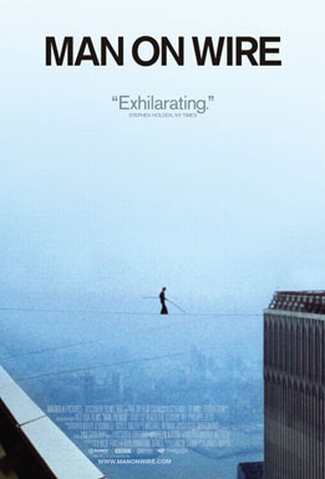
Read other New Yorker writers’ reflections on September 11th, ten years later.
Saturday September 10, 2011
How Hollywood Is Outsourcing U.S. Movie Audiences
Let's talk about the billion-dollar movies for a second. As of today, September 10, 2011, there are 10.
“Titanic” was the first to gross over $1 billion worldwide, back in 1997, and it shattered the mark, pushing all the way to $1.8 billion.
The second film to break $1 billion was “Lord of the Rings: Return of the King,” which grossed $1.1 billion in 2003. Then “Pirates of the Caribbean: Dead Man's Chest,” with $1.06 billion in 2006. “Dark Knight” did it in 2008 ($1.001 billion) and “Avatar” in 2009 ($2.7 billion).
That's five movies. It was a relatively rare event.
In the last two years—a year and a half, really—we've doubled that total: “Toy Story 3” ($1.06 billion) and “Alice in Wonderland” ($1.02) last year; and the final “Harry Potter” ($1.3), “Transformers: Dark of the Moon,” ($1.1), and “Pirates of the Caribbean: On Stranger Tides,” with ($1.03) this year.
From a U.S. perspective, the most recent “Pirates” movie, the fourth in the series, is the biggest head scratcher of the bunch. It bombed, relatively speaking, in the states, grossing a mere $240 million, the lowest total by far of the series, and nearly $200 million off the second “Pirates” movie, “Dead Man's Chest,” which grossed $423 million domestically in 2006. Yet POTC 4's worldwide gross is on par with, and may surpass, POTC 2. How is it making up that $183 million deficit?
Two ways.
More money is being made from the countries to which the film has traditionally been distributed. Yes, some countries, following the U.S. example, and despite inflationary ticket prices, are way down from the 2006 gross. In the U.K., POTC 4 fell off of POTC 2's total by $44 million. It grossed $9 million less in Spain (despite Penelope Cruz) and $3 million less in Denmark. That downward trend is also apparent in Belgium, New Zealand, Sweden, South Korea, Greece, Italy, Austria and Iceland. Altogether, in these 11 countries, the most recent “Pirates” dipped $64 million versus its 2006 incarnation.
Chart 1: Comparing the international grosses of two “Pirates of the Caribbean” movies: “Dead Man's Chest” (2006) and “On Stranger Tides” (2011)*
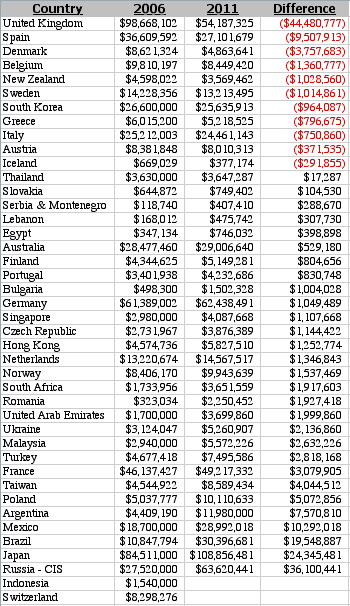
* All box office grosses are from boxofficemojo.com. “Stranger Tides”'s Indonesian and Swiss box-office totals are unavailable.
But the new “Pirates” more than made up for it in other countries, led by Russia-CIS, where it was up $36 million, and followed by Japan (+$24m), Brazil (+$19m) and Mexico (+$10m). Altogether, in these 28 countries, POTC 4 grossed $135 million more than POTC 2, for a net gain, from the traditional markets, of $71 million.
That's the first way it's made up the deficit.
The second way is that “Stranger Tides” has simply opened in more countries—32 more countries to be precise—including Vietnam, Qatar, Kuwait, India (surprisingly), and the big daddy of them all, China, where it's grossed $70 million this summer. Altogether, these 32 countries, 13 of which have yet to disclose box office grosses, added more than $100 million to the till.
Chart 2: Box office totals for “Pirates of the Caribbean: On Stranger Tides” (2011) in internatinal markets where “Dead Man's Chest” (2006) did not play*

* All box office grosses are from boxofficemojo.com.
Taken with the higher gross from the traditional markets, that makes up for the U.S. deficit.
This, I assume, will be the new norm for big international films. Inflation and aggressive distribution, and more leisure time in countries like China, will lead to more billion-dollar movies, even if the U.S. goes “meh” to the film.
Hollywood, like any industry, and Disney, like any corporation, is expanding its reach, and in doing so protects itself against a crappy product, as I believe POTC 4 to be. Business for this film was down in the U.S. because it was a poor film, with poor word-of-mouth, and it followed a crappy sequel, “Pirates 3,” which followed an overblown sequel, “Pirates 2,” which followed a not-bad movie, “Pirates,” way back in 2003. You can't keep doing that and not suffer financially. Yet, for a time anyway, Disney, with its aggressive expansion, has managed not to suffer financially for its poor product.
It almost feels as if moviegoers in the United States are being bypassed. It's as if we're being outsourced. First companies outsourced U.S. production; now they're doing it with U.S. consumption.
Expect a “Pirates 5.”
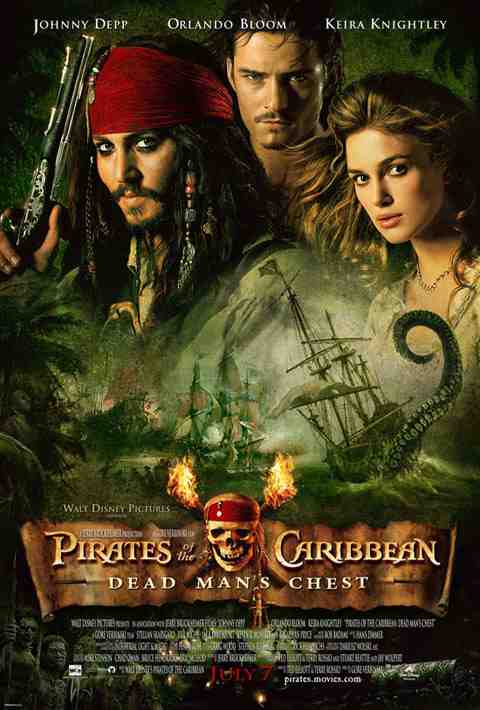
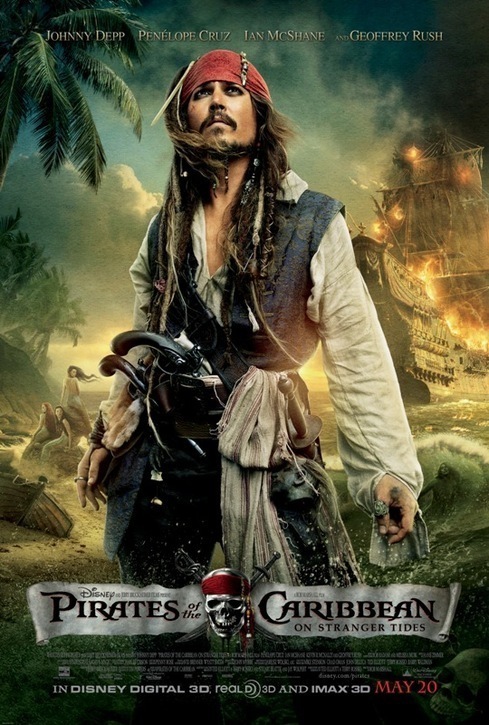
“Dead Man's Chest” (2006) made 39.7% of its total box office in the U.S.; “Stranger Tides” (2011), 23.2%. Yet they've grossed virtually the same at the worldwide box office.
Friday September 09, 2011
The Lost Scenes of “Citizen Kane”
“As the writing team came back from Victorville, and as Houseman returned to New York, Welles took over the task of making the script into a picture. From mid-April to  mid-July, the script came down to 172 pages [from 268]. Many episodes were abandoned—for example, Kane's honeymoon with his first wife, Emily; a later meeting between Kane and his father, when the older man is remarried to a ‘young tart’; Kane's son's involvement in a fascist movement; a good deal of political byplay with an oil scandal; scenes in Rome, when Thatcher goes to visit Kane; an affair Susan Kane has with a younger man at Xanadu. These deletions made Kane simpler to follow—and we should realize that nothing hurt it more on first release than its difficulty. In addition, Welles strengthened the line of dramatic consequence—the way Kane's career hinges upon the exposure of the love nest during the electoral battle with Jim Gettys, and the way Susan's nightmare career breaks the bond between Kane and Leland.”
mid-July, the script came down to 172 pages [from 268]. Many episodes were abandoned—for example, Kane's honeymoon with his first wife, Emily; a later meeting between Kane and his father, when the older man is remarried to a ‘young tart’; Kane's son's involvement in a fascist movement; a good deal of political byplay with an oil scandal; scenes in Rome, when Thatcher goes to visit Kane; an affair Susan Kane has with a younger man at Xanadu. These deletions made Kane simpler to follow—and we should realize that nothing hurt it more on first release than its difficulty. In addition, Welles strengthened the line of dramatic consequence—the way Kane's career hinges upon the exposure of the love nest during the electoral battle with Jim Gettys, and the way Susan's nightmare career breaks the bond between Kane and Leland.”
—from “Rosebud: The Story of Orson Welles,” by David Thomson; pg. 147
Thursday September 08, 2011
Movie Review: Crime D'amour (2011)
WARNING: SPOILERS THAT TRADE SUSPENSE FOR MYSTERY
Google “Hitchcockian thriller” and you’ll get more than 68,000 results, including such recent films as “Unknown,” “Source Code,” “With Friends Like Harry,” and, yes, “Crime d’amour,” starring Kristin Scott Thomas as Christine, the boss from hell, and Ludvine Sagnier as Isabelle, her sometimes flustered protégé.
What’s Hitchcockian about it? Ten minutes into the movie, we get this scene. Christine and Isabelle are about to leave Paris for Cairo on a business trip when Christine—with a better offer, an apparent weekend fling—decides to send Isabelle alone. She offers this advice: “You should do something with your hair. Let’s see it down.”
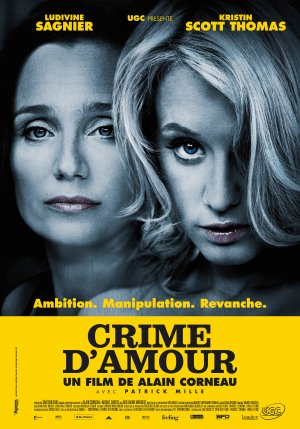 Isabelle, blonde and pretty, obliges. For a moment, a belittling amusement shines in Christine’s eyes. Then she shrugs.
Isabelle, blonde and pretty, obliges. For a moment, a belittling amusement shines in Christine’s eyes. Then she shrugs.
“Keep it up,” she says, dismissing her and going back to work.
Alfred Hitchcock, lover of pretty blondes with their hair in a chignon, would surely agree.
But that’s about as Hitchcockian as we get.
Yes, there’s a crime, and the wrong person is accused. But Hitchcock was a pungent filmmaker. He loved the horrific reveal, the discordant clang on the soundtrack. He wanted to push our faces in it. “Crime d’amour,” in comparison, is distant. The film itself is an icy cool blonde.
(More on Hitchcock later.)
The movie begins with a late-night brainstorming session between Christine and Isabelle at Christine’s mansion. Ideas are tossed out and Christine flirts with her subordinate in a way that flirts with illegality—at least under U.S. law. She comes up close to her. She tells her she smells good. She gives her a scarf. Then her lover, Philippe (Patrick Mille), shows up, and Isabelle, flustered, possibly hot-and-bothered, is told to leave by the back door.
Christine is hardly the perfect boss. When the Cairo meeting goes well because of an innovation from Isabelle, Christine takes credit—in front of Isabelle. But when Isabelle, spurred on by her subordinate, Daniel (Guillaume Marquet), hides her latest idea from Christine—an idea that will raise company value by 20 percent—she gets sole credit, and the D.C. mucky-mucks, suspecting Christine’s subterfuge, delay her promotion to New York. Thus begins Christine’s revenge. She uses Philippe, with whom Isabelle became intimate in Cairo, to set up and stand up Isabelle, then films Isabelle’s emotional response and shows it during an office party “pour rire,” she says. For a laugh. From Isabelle’s computer, she sends herself a threatening note, then threatens to use it, this fictitious threat, against the younger woman if she doesn’t fall in line.
Isabelle’s reaction? She slits Christine’s throat.
On one level, I was disappointed. Really? No more Christine? That’s as bad as the boss-from-hell gets?
On another level, I was amused. Christine is busy playing feminine cat-and-mouse games, attempting to destroy her rival’s spirit bit by bit, and Isabelle’s response is as male as it gets. Nothing “bit by bit” about it.
Finally, I was intrigued—at least initially. In the aftermath of the killing, which was sudden and clean, Isabelle incriminates herself. She cuts off a bit of a scarf Christine gave her and puts it in Christine’s right hand. Then she takes Christine’s left hand, dips it in the blood that’s been pooling on the floor, and uses it to write out “I-S-A...” Then she goes home, calls in sick for the day, and waits for the police. When they arrive, she acts dazed. At the police station, they confront her with the threatening email, and, still dazed, she confesses. Off to prison.
All the while we’re wondering: What is she up to? More, what is writer-director Alain Corneau up to? Why does he reveal her culpability so early? Why not delay the murder scene, give us calling in sick and being hauled downtown and prison, so we’ll assume Isabelle is falsely accused? So we may even assume Christine masterminded the whole thing? Why give up all that?
Back to Hitchcock for a moment. One of the initial criticisms of “Vertigo,” which is now considered one of the greatest movies ever made, was how the filmmaker revealed the backstory of Judy Barton (Kim Novak) to us before Scotty (James Stewart) could figure it out. Some critics complained that, in doing so, Hitchcock sacrificed mystery for suspense, but Hitchcock was always willing to do this. He was always about suspense before mystery. He wanted us on the edge of our seats.
Corneau’s big reveal does the opposite. He sacrifices the suspense of the wrongly accused for the mystery of “What is she up to?” Our uncertainty for the rest of the movie isn’t anxious or excited, as with Hitchcock; it’s intellectual. We’re not on the edge of our seats. We’re leaning back, wondering. In this way, “Crime d’amour” isn’t Hitchcockian at all; it’s anti-Hitchcockian.
Surely, I wondered, Corneau has a good reason for letting the air out of the movie. Surely Isabelle has some kind of master plan that will make us all go, “Ahhh!”
She does, but it makes us go, “Eh.”
Isabelle sets herself up only to free herself, as a way of getting past the incriminating email threat. She knew she would be a suspect so she made herself one, then planted the evidence that would set herself free and imprison Philippe. Afterwards, she is welcomed back at the company, gets Christine’s office, and continues on her upward business trajectory.
But so what? She kills Christine without Christine knowing it. Is that revenge? Plus she tarnishes her own name in the process. Was there no better way?
Then there’s the mystery of the title: “Love Crime.” Isabelle’s love for Christine, one assumes. Philippe is an afterthought here. He’s a plaything between two cats—one a housecat, the other a lion. But that makes the crime even more incomprehensible. Doesn’t all the fun go out for Isabelle after Christine is extinguished? Doesn’t she need Christine there to witness her triumph? She’s able to increase a company’s worth by 20 percent in her spare time but can’t she come up with a better revenge plot than this?
Cue Hitchcock. Harrumph.
Wednesday September 07, 2011
Quote of the Day
“I can’t help wondering if 'Believing Is Seeing' is the first installment in a three-volume attempt to make sense of the relationship between the documentarian, the documented and the truth. I hope so. For Morris, the truth is (as they say) out there; the question is how to pick our way in its direction. There is no mechanical means of doing so, he argues; the camera is never wholly obscura or lucida. Perhaps this is why Morris’s book feels so human. It combines the hubris of his ends — the desire, shared by approximately all of us, to lay claim to the truth — with the humility of his means.”
--Kathryn Schulz in “Limited Vision,” her review of Errol Morris' new book “Believing is Seeing: Observations on the Mysteries of Photography,” in last Sunday's New York Times
Wednesday September 07, 2011
My Long and Winding Road to a Piece of 'Twin Peaks' Cherry Pie
In 1990, I watched most of the first season of David Lynch's “Twin Peaks” at my father's house in Minneapolis, caught the second-to-last episode at my sister's place in Seattle, and saw the final episode of the first season about a month later, in Taipei, Taiwan, when my father (finally!) shipped it to me. You could say I was hooked.
Initially I assumed its locale was Michigan: all those Douglas firs and proximity to Canada, I suppose. Turned out it was Washington state, where I moved in 1991. For a time I worked at the University Book Store, where the diary for Laura Palmer had been bought by someone on Lynch's production team, and every so often I visited North Bend, the true locale for the show, for a hike up Mt. Si. But I never went into Twede's Cafe, formerly the Mar T Cafe, home of cherry pie and that damn fine cup of coffee. Hey, is that how the whole coffee thing began? Does Howard Schultz owe his fortune to David Lynch and Special Agent Dale Cooper?
Haven't really thought about the show much since, to be honest, but Sunday I drove out of Seattle early to hike up Bare Mountain, whose trailhead is approximately 24 miles north of North Bend, mostly on dirt roads. The hike turned out to be a bust. In the first hour I had to climb over five trees that had fallen on the trail, each one an omen; then the trail became so overrun with vegetation, six or seven feet high, that I practically needed a machete to keep going. I fought my way through one patch, then another, weeds scraping my shins and drawing blood; but when the third patch appeared, and I couldn't for the life of me see where the trail might finally rise above the tree line, I feared I was on the wrong path and backtracked, then wound up backtracking all the way to the trailhead. So instead of summiting on a sky-blue day, I had a two-hour walk in the woods and weeds.
Driving back over the dirt road, I decided, in order to salvage some part of the day, to finally stop at Twede's.

It took a second for my eyes to adjust to the darkness of the restaurant. One o'clock on a Sunday but the place was bustling. A few booths were open but I opted for the counter, then opted for a burger and fries. So far that day I'd only had coffee and sweet things (trail mix, etc.), so coffee and cherry pie didn't appeal. As I was eating, I did something Dale Cooper couldn't do back in 1990: I checked my email on my smartphone and found a back-and-forth between Patricia and our neighbor Ward about an outdoor dinner party we were all attending that evening in downtown Seattle. Ward talked about picking up the ingredients for a peach pie; Patricia suggested she and I get bread or cheese on the way. To me, an alternative immediately suggested itself:
Cherry pie.
Two birds. We wouldn't arrive empty-handed and I could finally have my “Twin Peaks” cherry pie after all these years.
Patricia was initially against the idea. Ward was baking a pie, she said, so it seemed gauche, or at least territorial, to bring a pie of our own. Ward overruled her. “You can never have too much pie,” he wrote.
The dinner party overlooked Puget Sound. As the sun faded, so did Patricia. She'd just had arthroscopic surgery and was still in the recovery phase. In fact, the dinner party was her first night out. So we left. Before the pie. Which we left behind.
The next morning, after making coffee and feeding our cat, Jellybean stood meowing by the door to be let out into the condo hallway. It's part of her morning ritual.
When I opened the door, I noticed something on the floor: A white cardboard box. Jellybean began sniffing at it. I lifted it up and, yep, there it was, three-quarters of the Twede's cherry pie, which Ward had brought back for us.
So after more than 20 years, I finally had my slice of damn fine cherry pie. And it was.

Now if I could only get me some of that grapefuit—freshly squeezed.
Tuesday September 06, 2011
It's the Day After Labor Day: Has Everyone in Seattle Forgotten How to Effin' Drive?
I mean more than usual.
My bikeride home from work, lower Queen Anne to First Hill, takes about 15 to 20 minutes. Today's trip was bookended by two trucks, the first on Thomas and Queen Anne North, the second on 9th and Madison, both making right-hand turns from the left lane. I must see this a couple of times a week but rarely twice during the same ride.
But those drivers were the smart ones. In-between, a woman in an SUV half-ran a red light on Denny and Second and nearly ran into a motorcyclist. She squealed to a halt halfway through the intersection, then decided to go ahead until I yelled at her to watch out for me coming through the intersection. When I was safely past her, she kept going through the red. Her son was in the passenger's seat.
Continuing on Second, another woman, this one in a sports car, roared past close to the bike lane. Second Avenue is one-way heading south, the bike lane is on the left, and when the light turned green at Battery, she roared ahead of the cyclist ahead of me, forcing him to brake, dismount, curse, give her the finger. I was heading the direction she was, so I saw her at Battery and 3rd, stopped at another red, 20 feet from the intersection, absorbed by a mobile device. When the light turned green it took her 10 seconds to realize it and bolt ahead again. I saw her again on 5th, continuing to drive recklessly, one hand on the mobile device.
Tuesday September 06, 2011
The World Trade Center in Movies Before 9/11 ... and After
I wrote this for MSNBC.com on the fifth anniversary of 9/11 ...
It doesn’t take long to get chills watching Oliver Stone’s “World Trade Center.” The film begins with the red numerals of an alarm clock coming into focus. Port Authority cop John McLoughlin (Nicholas Cage) wakes up, takes a shower, checks the kids and leaves for work as dawn breaks over the Manhattan skyline. On his car radio we hear, “It’s Tuesday...”
For me, that’s all it took. I thought: “Yes, it was a Tuesday.”

Tuesday, Sept. 11, 2001, in Oliver Stone's “World Trade Center” (2006).
Tuesday
That Tuesday I was spending what I thought was the last day of a week-long trip visiting my sister and friends in Detroit. My sister’s marriage was just two years old; her first son, Jordy, was just two months old. We were going to a Tigers game that night at Comerica Park and the next morning I would fly back to Seattle. I was already thinking ahead to Seattle.
I was sitting in their breakfast nook reading Mitch Albom in the Detroit Free-Press when my brother-in-law, Eric, who had just left for work, returned to stick his head in the front door. “You might want to turn on CNN,” he said. “A plane just flew into the World Trade Center.”
I assumed a single-engine. Hadn’t that happened to the Empire State Building?
When I turned on CNN and saw the damage and listened to the commentators, it became apparent this was more than a single-engine. But how could a commercial plane be so off-course? How could you miss the World Trade towers? The eventual answer was: you couldn’t.
At one point I went upstairs to wake my sister—I had the baby monitor and Jordy was waking—and when we all returned to the living room my sister, a reporter for The Wall Street Journal, said, “I thought you said it flew into one tower.” I nodded. “So why are both on fire?”
I couldn’t figure it out. Then came news of the Pentagon and rumors of the Capitol. We’re under attack, I thought. When the towers collapsed, I thought: This is irreversible.
“I don’t think we’re going to the Tigers game tonight,” my sister said.
“I don’t think I’m flying out of here tomorrow,” I said.
All the while I kept thinking the same thought a lot of people were thinking: It feels like a movie.

“You might want to turn on CNN,” he said. “A plane just flew into the World Trade Center.”
The Rosencrantz and Guildenstern of landmarks
While it was standing, the movies had never been particularly kind to the World Trade Center. It’s not just that Hollywood tried to destroy the towers in movies like “Meteor,” “Armageddon” and “Deep Impact”; it’s the kind of movies the World Trade Center appeared in.
Other landmarks got the good films. The Empire State Building played pivotal roles in the original “King Kong,” “An Affair to Remember” and “Sleepless in Seattle.” Mt. Rushmore had its close-up in Hitchcock’s “North By Northwest.” The Statue of Liberty? From the ending of “Planet of the Apes” to the battle royale in “X-Men,” the Statue’s done it all. It’s the first thing immigrants see upon arriving in this country (“Godfather Part II”) and the last thing Americans see when leaving to fight abroad (HBO’s “Band of Brothers”).
The World Trade Center, in comparison, has appeared in crap. It obviously needed a better agent: “The Wiz,” “The Squeeze,” “The Dream Team,” “Big Business,” “The Bonfire of the Vanities,” “Godzilla,” “End of Days,” and a host of forgettable sequels: “Home Alone 2,” “Die Hard: With a Vengeance,” “American Pie 2,” and “Friday the 13th Part VIII: Jason Takes Manhattan.” The towers, interchangeable and rarely pivotal, stayed in the background. They were the Rosencrantz and Guildenstern of landmarks.
Before 9/11, the World Trade Center was never particularly beloved. “A standing monument to architectural boredom,” said one critic in the early 1970s. “Two huge buck teeth” blighting the Manhattan skyline, said Norman Mailer. Earlier skyscrapers tended to end like church spires, pointing towards the heavens—the Empire State Building is even called “The Cathedral of the Skies”—but tapering means losing valuable real estate. Thus modern skyscrapers’ blocky shape. The World Trade towers pointed at nothing. They just stood there like tall lunks. They came to represent not architectural beauty like the Empire State Building, nor the liberty of the Statue, but blunt financial power. “Greed is good,” Gordon Gekko famously says in Oliver Stone’s “Wall Street,” and so the film begins with morning shots of the Manhattan skyline, with the World Trade Center front and center. “I have a head for business and a bod for sin,” Tess McGill says in Mike Nichols’ “Working Girl,” but this is a feel-good movie, and so in the single-shot opening, the focus is on another working girl, the Statue of Liberty, who gets her 360-degree close-up. The twin towers are once again relegated to the background.

The World Trade Center, relegated to the background again, from the accidentally prescient opening credits of “Pushing Tin” (1999)
Winged migration
Now those very background shots take our breath away. God, the World Trade Center towered, didn’t it? It towered over even New York City, which towers over the world. Other cities have one tall building, but only New York, New York had the audacity to throw up two. Now that they’re gone, the skyline doesn’t look the same. Now that the buck teeth have been knocked out, we keep probing their absence with our tongue.
Certain scenes in pre-9/11 movies seem like bad foreshadowing. “Pushing Tin” from 1999 begins with a jet airliner banking toward the World Trade Center on a sky-blue day. Bennet Miller’s 1998 documentary, “The Cruise,” about New York City tour guide Timothy “Speed” Levitch, includes these lines: “Sometimes I like to spin between the two towers. You know, like spin around and make yourself dizzy? And then you look up, and it looks like the buildings are falling on top of you.”
9/11 gave the World Trade Center the deeper meaning it never had in life, and Hollywood’s initial reaction was to remove it from any unreleased movie. “Zoolander”? Gone. “Spider-Man”? Gone. The towers now had too much meaning. We couldn’t bear looking at them.
Slowly, though, the World Trade Center began to reappear in our movies. Halfway through Jacques Perrin’s beautiful documentary, “Winged Migration,” there it is, gloriously, one of many man-made landmarks birds pass by in their journeys. It’s the focus of the entire eighth episode of Ric Burns’ comprehensive “New York” documentary, and the two exclamation points punctuating the end of Steven Spielberg’s 2005 film, “Munich.”
It’s also the centerpiece of the Naudet brothers’ stunning documentary “9/11,” which aired on CBS in the spring of 2002. The two French brothers were filming a year in the life of a probationary New York City firefighter stationed near the towers. On the morning of September 11th a crew was investigating a potential neighborhood gas leak when a plane soared overhead—something you never hear in Manhattan—and the firefighters looked up. Cameraman Jules Naudet followed their gaze and caught the only known footage of the first plane flying into the north tower. Most footage of the second plane flying into the south tower was taken from a distance by news organizations already at the scene of a disaster. Naudet’s footage is taken from the ground, by people in the middle of an ordinary day, doing an ordinary job, and the plane attacks a peaceful setting. It’s one of the worst violations imaginable.
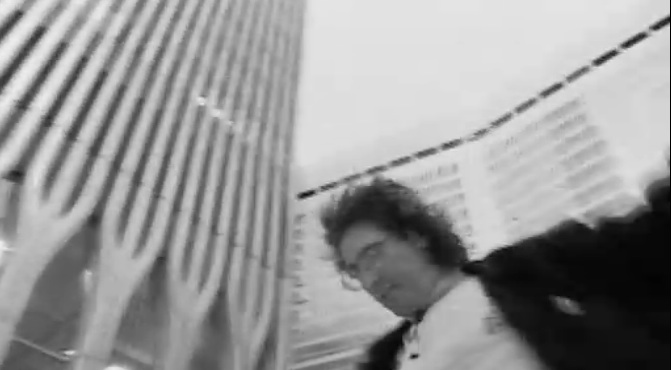
“Sometimes I like to spin between the two towers. ... then you look up, and it looks like the buildings are falling on top of you.” --Timothy “Speed” Levitch, 1998.
A less-Hollywood version of events
This year, 9/11 has been the subject of two major films: Paul Greengrass’ “United 93” and Oliver Stone’s “World Trade Center.” Both have been the subject of controversy. Some feel Hollywood shouldn’t profit from this tragedy. The right-wing doesn’t trust liberal Hollywood to tell this story, while the left-wing doesn’t trust wish-fulfillment Hollywood to tell this story. Many feel it’s just “too early.”
All of this criticism ignores the fact that we’ve been telling ourselves the story every day since 9/11. The versions we tell ourselves are often fiercely partisan (see Karl Rove’s comments in New York in June 2005) and full of the conceits of Hollywood movies. These conceits include action-hero catch-phrases (“Let’s roll” and “dead or alive”), bold and outsized personalities, and an anticipation of a happy ending.
Hollywood is actually giving us a less Hollywood version of events than we’ve given ourselves. The films they’ve created are human-sized, the heroes ordinary men and women. In “United 93,” a passenger says “Let’s roll,” but quickly and anxiously, without the action hero cadence we’ve given it in our imaginations. In “World Trade Center,” Nicholas Cage as John McLoughlin wears the most ordinary face a movie star can wear, and when his team of Port Authority cops show up at the south tower and look up, you see confusion and fear in their eyes. This isn’t in the manual, they seem to be thinking. When McLoughlin asks for volunteers to go inside, few do, and you don’t blame the others. Once inside, they don’t seem to know what to do. Because: This isn’t in the manual.
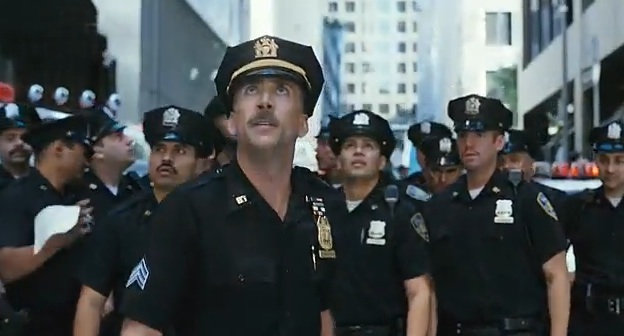
“This isn't in the manual.”
Ground Zero
The twin towers of the World Trade Center rose a quarter-mile in the air and each was made of nearly 100,000 tons of steel. In the fall of 2002 I visited Ground Zero, at which point it looked like nothing so much as the construction site it had been in 1966. I remember looking up at a neighboring skyscraper that was maybe 50 stories high, and tried imagining it more than doubled to 110 stories. Then I tried imagining two of them, and both coming down. I could not.
The destruction of the World Trade Center reminded many of us that day of a Hollywood movie. How ironic that it's taken Hollywood to remind us, no, it wasn’t like a movie at all.
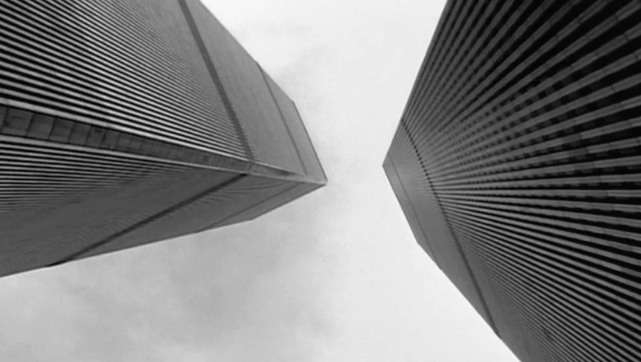
Monday September 05, 2011
Idiots, the Bush Administration, and 9/11
At an outdoor dinner party last night, overlooking Puget Sound, the subject got around to freedom vs. safety, and I mentioned how most people would give up the former for an imagined version of the latter (not a very original thought), and that our reaction to 9/11 was indicative of this (another not very original thought). One of the other guests disagreed. We went back and forth in a genial enough manner. He felt we hadn't given up any freedoms post-9/11. Then he talked about how 9/11 was foreseeable to anyone who was paying attention. We had the following exchange:
He: Anyone who didn't see 9/11 coming was an idiot.
Me: Or in the Bush administration.
He: Don't go there.
At this point I was warned away from the conversation by the hostess. I later found out that the guy I'd been talking to was, like the hostess, a Republican and a Bush supporter. If only I'd known. I would've totally gone there.
Sunday September 04, 2011
My Top 10 Movies of 2011 (January-August)
I meant to do this in June, the halfway point of the year, but I was scrambling with work, reviews, and prep for a week's vacation in Minnesota and never got around to it. The end of July passed, too, without an attempt. But the beginning of September is actually a good place for this. Awards season is starting, all the critics with inside knowledge are predicting the nominees before they've seen the films (and sometimes before we've heard of the films), and the first 8 months, the ones we just lived through, are dismissed as fun but inconsequential.
But not all were inconsequential.
Here are the movies from the first 8 months of the year I'm glad I saw:
10. Captain America: The First Avenger: Cap was my second-favorite Marvel character in the mid-1970s, after Spider-Man, and Joe Johnston and all of his screenwriters did Cap right. They improved upon him, as you need to do, since comic book origins were often pretty lame back then. They gave Steve Rogers a backstory here. They held so long on the skinny, asthmatic Steve Rogers (a mere blip in the comic books), that even when he turns into the real Chris Evans, muscles both huge and baby-smooth, we never lose sight of the scrappy, scrawny dude he was. Is. Only the ending of the movie is a misfire. Review excerpt:
Col. Phillips (Tommy Lee Jones) is a soldier and wants a soldier—a real soldier, not some 98-pound asthmatic—to be the first super-soldier. The back-and-forth between Phillips and Dr. Erskine (Stanley Tucci) is wonderful—particularly in the scene where Phillips lets loose a dummy grenade amid the candidates and only Rogers falls upon it—because Jones and Tucci are so good. The amused warmth in Tucci’s eyes; the hardened authenticity in Jones’ face. We should, in fact, pause to contemplate Tommy Lee Jones for a second. Time and again, he is asked to play the guy tracking or getting in the way of the ostensible hero, yet we love his character all the more for it. Because his character has character? Because he’s a man with a strict adherence to his job but not to his point-of-view? Because if you give him enough evidence, he’ll change? Worth an essay, one day.
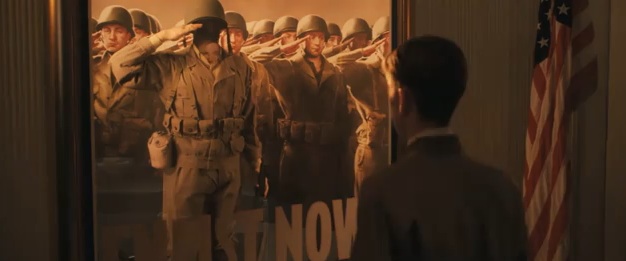
9. Win Win: I think of quiet and calm, as with most of Tom McCarthy's movies, along with a touch of Hollywood (the winning Hollywood wrestling scenes), and an attempt at getting at the ordinary lives of folks in the middle of the global financial meltdown. What ethics will you give up in order to make financial ends meet? But McCarthy doesn't get it quite right: Review excerpt:
The ethical lapse is confronted personally but not penalized professionally, while the solution Mike feared in the beginning—getting a second job as a bartender—is the solution he embraces in the end. It’s not exactly a Hollywood ending but there are Hollywood elements to it. The economic crisis in the film world means having to take a second job; the economic crisis in the real world means being unable to find the first.

8. Buck: The documentary isn't as good as its subject, Buck Brannaman, the original horse whisperer, and the ending is again a misfire. Why was the spoiled horse put down? What did Buck think of this? Why wasn't he interviewed about it? But Brannaman himself—the abused boy who becomes an empathetic communicator with animals most of us can't fathom—makes it all worthwhile. Excerpt:
He “starts” horses, he says, he doesn’t break them. His approach is discipline without punishment, empathy without sentimentality. Horse people come to his seminars skeptical and leave stunned. Their tough love doesn’t work. Their soft love doesn’t work. But Buck gets in the ring and in five minutes their horse is following him around like a dog. He takes an unfocused horse and focuses him. He takes a skittish horse and calms him. The advice he gives goes beyond horses.
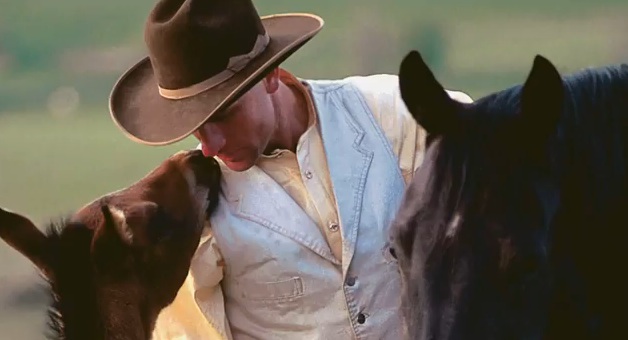
7. Tabloid: A Love Story: The creepiness of Errol Morris' latest documentary hasn't left me. It's about some of the worst aspects of our modern culture. It's about a kind of massive self-delusion. It's also about the way female power diminishes with time and age and weight. Excerpt:
Once upon a time she was a beauty queen, blonde with an OK face and a good body, and she used that to her advantage. She got men to do things for her because of that advantage. But time took it away. Yet there she was, still talking, still presenting her case, as if she still had that power. And it’s her very insistence that she still has that power that reminds us of the shallowness of that power. If it had been Angelina Jolie outside the SIFF screening, we would’ve been captivated and maybe even sympathetic. That’s awful... what he promised you... what he did to you... Instead some short, fat, dumpy woman was yakking away. About something. As if we cared. In a way, nothing reveals how nuts she is more than this fact: She thinks we still care even though she looks like she does.
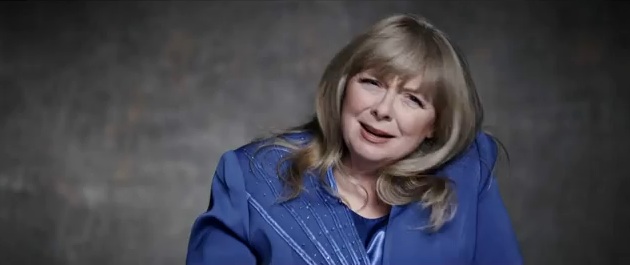
6. The Housemaid: The film begins in almost cinema verite fashion, becomes a sexy thriller, with the inevitable subsequent violence and death and search for revenge, and ends in almost David Lynchian fashion. But it's the sexiness, the heavy sexiness of the film, that has stayed with me. Excerpt:
We know what’s going to happen, of course. We’ve seen the poster—Eun-yi crouched before a bathtub, all bare legs and apron, something breathless in her face—and we’ve read the synopsis, full of words like “erotic” and “steamy.” That’s what draws us in. That’s why we’re in the audience. But those adjectives are slightly misleading. At a mountain resort, yes, Mr. Goh enters the servant quarters with a bottle of wine, demands Eun-yi reveal her body, feels her up, demands and receives oral sex. But nothing is particularly “steamy.” This is a cold thriller. It’s filmed cold, its people are cold, they live in a cold mansion. Dark blues and steel dominate. The first words in the movie, in fact, are “It’s cold, where should we go?” Only the revenge at the end is served hot.

5. The Trip: I saw this a month ago (two months ago?) but never wrote the review. Will soon. It's a documentary, but the fictional kind, a “Curb Your Enthusiasm” type of documentry, in which Steve Coogan plays Steve Coogan, on a road trip with a friend, Rob Brydon, played Rob Brydon. Coogan is the fussy, lonely egotist while Brydon is the friendly everyman—we get that at the get-go—but by the end it's Coogan we identify with. He may be a successful actor and star, and a prick, but there's this sense that life is passing him by and he'll never be able to do what he wants to do. Brydon keeps trotting out a popular character he does on the BBC, the “small man in a box.” That's Coogan. That's all of us.
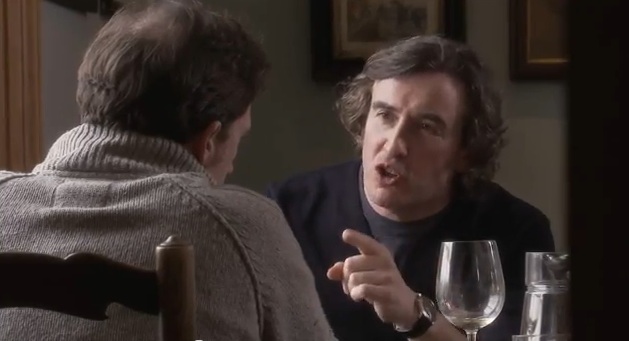
4. Bridesmaids: Funniest movie of the year. Hands down. My fear is that its success ($162 million, 9th-best box office of the year so far) will either lead to nothing, no new female-centered comedies, or they'll make dopey versions and then give up when they don't succeed. A reminder, Hollywood: The key to the comedy is in the relationships. I could watch, for example, Kristen Wiig and Maya Rudoph riff over breakfast for an entire movie. “My Breakfast with Maya.” I'd pay to see that. Excerpt:
She’s her own worst enemy. She keeps going back to the wrong guy (Ted), keeps ignoring the right guy, Irish cop Rhodes (Chris O’Dowd). She loses her job, is forced to move home with her mother (Jill Clayburgh, the original unmarried woman), and winds up crying on the couch to Tom Hanks in “Castaway.” We’ve seen this kind of thing before yet it feels different here. It’s funnier, yes, but it also feels truer. The way people try to talk Annie out of her downward spiral and the way she doesn’t listen. There’s a scene where, after Rhodes encourages her to bake again, she does, she bakes a glorious cupcake, topped with all kinds of candied configurations. Then she stares at it on the counter, unhappily. Then she eats it, unhappily. Not because she wants the cupcake, one assumes, but because she doesn’t want to make the cupcake. Because baking isn’t satisfying what it used to satisfy.

3. Midnight in Paris: Welcome back, Woody. How I've missed you. There's a kind of love story here (with Marion Cotillard's character) and an anti-love story (with Rachel McAdams' character) but the true love is with art and literature; with things that matter in a world where little does. It's about finding your club—the people with whom you belong. And in Owen Wilson, Woody has finally found the protagonist best able to replace himself. Wilson is west-coast Woody. He's able to do Woody and still be himself. Excerpt:
It’s not until they go to another bar and meet Ernest Hemingway (Corey Stoll) that ... It’s less the other shoe dropping than the jaw dropping. It’s giving in to the fantasy, which Gil does when he asks Hemingway to read his manuscript. This Hemingway is a fully formed version who talks as Hemingway writes. When Gil praises his book—most likely “In Our Time”—Hemingway responds, “It was a good book because it was an honest book, and that's what war does to men. And there's nothing fine and noble about dying in the mud unless you die gracefully. And then it's not only noble but brave.” Hemingway talks moveable feasts and Fitzgerald calls Gil “old chap,” as if he were Gatsby, which not only makes sense—since, you could argue, all of this is in Gil’s head, so he’s not dealing with the real Hemingway and Fitzgerald but his versions of them—but it’s fun, too.

2. Des hommes et des dieux: This 2010 Cesar winner for le meiuller film is a monastic movie that transcends the world. It's about the beginning of what feels like the fundamental battle of our time, extreme Islamism vs. the rest of us. It's also based upon a true story: a group of Cistercian monks living in Algeria in the mid-1990s, who are caught in a civil war between religious extremists and a corrupt government but refuse to leave. It has a humble, day-to-day feel, then somehow expands in an existential manner. Excerpt:
Luc (the great French actor Michael Lonsdale) is gentle with patients and impatient with government officials questioning his patients. “I’m not scared of death,” he tells Christian at one point; then adds with a smile, a touch of monastic jocularity perhaps: “I’m a free man.” In an early scene, he sits on a bench in the winter sun talking to a local girl about love. She wonders what it feels like, and we, or the romantics in us, suspect she’s in love. When he gives her a description of love that is both simple and beautiful—“Something inside you comes alive...” he says, “but you’re in turmoil, especially the first time”—she responds, No, she’s never felt that, and certainly not with the boy her parents want her to marry. “Oh, c’est ca,” Luc answers. She asks Luc if he’s ever been in love and he answers, yes, several times. “Then I experienced an even greater love and I answered that call. Sixty years ago.” It’s such a beautiful scene I didn’t want to leave it. It shows us not only how much these Christian monks are part of the life of this Muslim village but why. They don’t proselytize about Jesus’ love; they quietly demonstrate it.
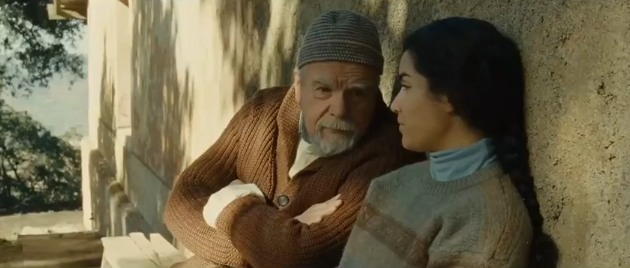
1. The Tree of Life: The ending doesn't work but it's still the best movie of the year. That's how powerful the rest of it is. That's how grand Terrence Malick's ambition and vision is. For him, it's not enough to give us the tale of a boy growing up in Waco, Tex., in the 1950s, caught between the love of his mother and the demands of his father, caught between good and bad, between the way of grace and the way of nature. No, Malick has to bracket this story with the beginning and end of time. He has to give us the earth forming and life beginning and moving to land. He has to remind us, as he reminded us with the film's epigraph, of God's response to Job: Where were you when I laid the foundation of the earth? Malick, who deals in immensity, wants to remind us of the immensity of those lines. And does. Excerpt:
When the father (Brad Pitt) returns, excited by his trips to China and Germany, things get worse. It’s a clash of the ways of nature. Jack sees his father flirting with a waitress, keeping the dollar bill just out of her grasp, and it’s like an earlier scene at school, where Jack had done the same with a pretty girl correcting his paper. He sees his father working under his jacked-up car, and he knows how easy it would be to kick the jack away. He actually looks around to see if anyone is watching. Even his prayers are now the way of nature rather than the way of grace: “Please, God, kill him. Let him die.” Then his father’s plant closes and his father returns diminished and the family is forced to move. The father calls Jack his sweet boy but Jack says, “I’m as bad as you are. I’m more like you than her.”
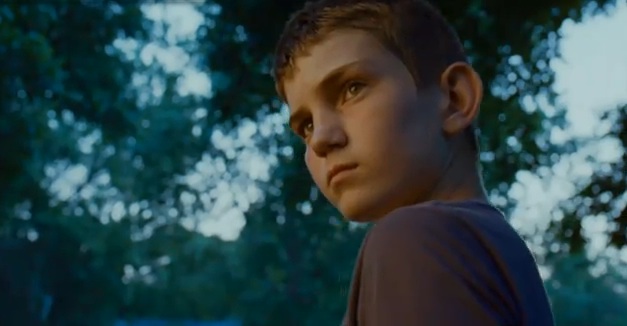
What about you? What did you see this year that was worth it?
Saturday September 03, 2011
Quote of the Day
“In so many respects, the Trade Center dead formed a kind of universal parliament, representing sixty-two countries and nearly every ethnic 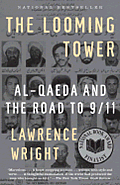 group and religion in the world. There was an ex-hippie stockbroker, the gay Catholic chaplain of the New York City Fire Department, a Japanese hockey player, an Ecuadoran sous chef, a Barbie doll collector, a vegetarian calligrapher, a Palestinian accountant. ... The manifold ways in which they attached to life testified to the Quranic injunction that the taking of a single life destroys a universe. Al-Qaeda had aimed its attacks at America, but it struck all of humanity.”
group and religion in the world. There was an ex-hippie stockbroker, the gay Catholic chaplain of the New York City Fire Department, a Japanese hockey player, an Ecuadoran sous chef, a Barbie doll collector, a vegetarian calligrapher, a Palestinian accountant. ... The manifold ways in which they attached to life testified to the Quranic injunction that the taking of a single life destroys a universe. Al-Qaeda had aimed its attacks at America, but it struck all of humanity.”
--from pg. 415 of Lawrence Wright's “The Looming Tower: Al-Qaed and the Road to 9/11”
Friday September 02, 2011
Dialogue of the Day: “Rois et reine”
“Your mother has asked me to adopt you. Do you know about that? I've thought about it and I've decided that it's not a good idea. I came here to tell you that.
I didn't know your dad but I think he was a great guy. He gave you a load of things: your name, your face...
So you already have a father. Okay, he's dead. That's sad. But it was before you were born and it's not easy to mourn a stranger.
There's a German poem about a boy whose mother is dead. [Speaks German] That means,”Your mother's soul lashes out at the sharks before you.“ That poem always reminds me of you because I think your dad's soul protects you from sharks.
So it wouldn't be a good idea for me to pretend to be your father now. Your mother used to say you and I should be friends. But a grown-up and a child shouldn't be friends. I know that when I was little, I didn't like those grown-ups who'd try to charm me or try to establish complicity with me. ...
I carry you in my heart now. Even if you turn into a total bastard or I don't see you for 1279 years, I have to think about you because I enjoy doing it. As a child, you don't have to think about grown-ups or about me. Unless you need to. ...
You see, the past isn't what's vanished. No, it's what belongs to us. What belongs to us now are the memories we both have. It's weird, isn't it? Because there's no name for what we share. ...
And I'd like you to see that doctor you got on well with. A child shouldn't talk only to his mother. A mother is great to look after you, to love you, for you to love, etc. But she's not enough to make you grow up. You need an extra adult to help you to grow so you're not shut up in the love between parents... and children. Maybe that scares Nora and not you. Nora probably thinks, ”My God, am I a good mother for Elias? Let's see the doctor.“ And you think, ”Nora's the one who needs the doctor, not me!“
That's smart. You can separate what she wants from what you want. In a way, you're right but... This is the only advice I have for now: Of course, we're always right. But it's always possible that we could be a bit wrong too. Being a bit wrong is very good news! It means you don't have the whole answer. That life will be more exciting and full of surprises than you thought.”
--Ismaël (Mathieu Amalric) talking to Elias (Valentin Lelong) in the great epilogue to Arnaud Desplechin's “Rois et reine” (“Kings and Queen”) (2004).

Thursday September 01, 2011
Darth Vader Speaks? Noooooooo!
George Lucas is at it again. This short video, from the upcoming Blu-Ray release of the original “Star Wars” trilogy, is making the internet rounds at hyperspace:
The addition of the melodramatic “Noooooooo!” is the problem for most “Star Wars” fans, but, let's face it, the scene sucked anyway. I dissected it for an MSNBC article, “Darth Vader Lives!,” back in 2005:
“Jedi” is the worst of the “Star Wars” movies because it illogically prolongs the obvious for imagined entertainment value. Thus Luke enters Jabba the Hutt’s lair without his light sabre so at the last instant R2D2 can shoot it to him and he can save the day. And thus, at the climactic moment Darth Vader watches his son getting fried by the Emperor. What will he do? Oh, what will he do? Witness some of the worst editing in movie history:
CUT TO: The Emperor shooting lightning from his fingers.
CUT TO: Luke writhing in pain.
CUT TO: Darth in close-up, witnessing.
CUT TO: Luke pleading for his father’s help.
CUT TO: Long shot of scene.
CUT TO: Luke writhing.
CUT TO: Darth, in close-up. (Deciding?)
CUT TO: The Emperor pausing to give his final speech: “And now young Skywalker, you will die.”
CUT TO: Darth, glancing back at his son.
CUT TO: Luke, in fetal position, with smoke coming off him.
CUT TO: The Emperor attacking again.
CUT TO: Darth witnessing.
CUT TO: Luke writhing.
CUT TO: Darth turning towards Emperor.
CUT TO: Emperor’s furious face in close-up.
CUT TO: Darth looking back at Luke.Yes, it’s a long journey back from the dark side but the scene makes Darth appear about as quick-witted as Homer Simpson. Stupid! Pick him up! Throw him over the railing! There you go. Finally.
Thursday September 01, 2011
What Brings You Here
- we must destroy, but productively led to the review of this great French documentary.
- bondage fixation led to the review of this recent comic-book documentary. Not, I'm sure, what the dude (or dudette) was looking for.
- science fiction movie with phrase “bonk,bonk on the head” took the reader to this movie review, which is more horror than science fiction, but in which I do reference that phrase. But it comes from original “Star Trek,” not a movie.
- did hitler have siffles led to this post, which is all about the Seattle International Film Festival (SIFF). I used SIFFles as a bad pun for sniffles, I guess. The reader meant “syphilis,” I assume.
- joel schumacher batman films are good in a camp way led to this much-read article on the history of Batman, where I agree on “camp” but not “good.”
- entourage prediction took the reader to this “Entourage” prediction .... from three years ago. Which didn't pan out.
- James M. McCallum = this movie review.
- metrodome moments = this farewell post.
- фирма которая делает кепки ny led to this article. Perhaps the Russians are interested in buying?

(L to R) Miri, Janice Rand, Dr. McCoy and Capt. Kirk in the first-season “Star Trek” episode “Miri.” Before the disease and the jealousy and the Bonk Bonk on the head.
Baseball's Active Leaders, 2023
What Trump Said When About COVID
Recent Reviews
Everything Everywhere All at Once (2022)
Black Panther: Wakanda Forever (2022)
Doctor Strange in the Multiverse of Madness (2022)
Spider-Man: No Way Home (2021)
The Cagneys
A Midsummer Night's Dream (1935)
Something to Sing About (1937)
Angels with Dirty Faces (1938)
A Lion Is In the Streets (1953)
Man of a Thousand Faces (1957)
Never Steal Anything Small (1959)
Shake Hands With the Devil (1959)













